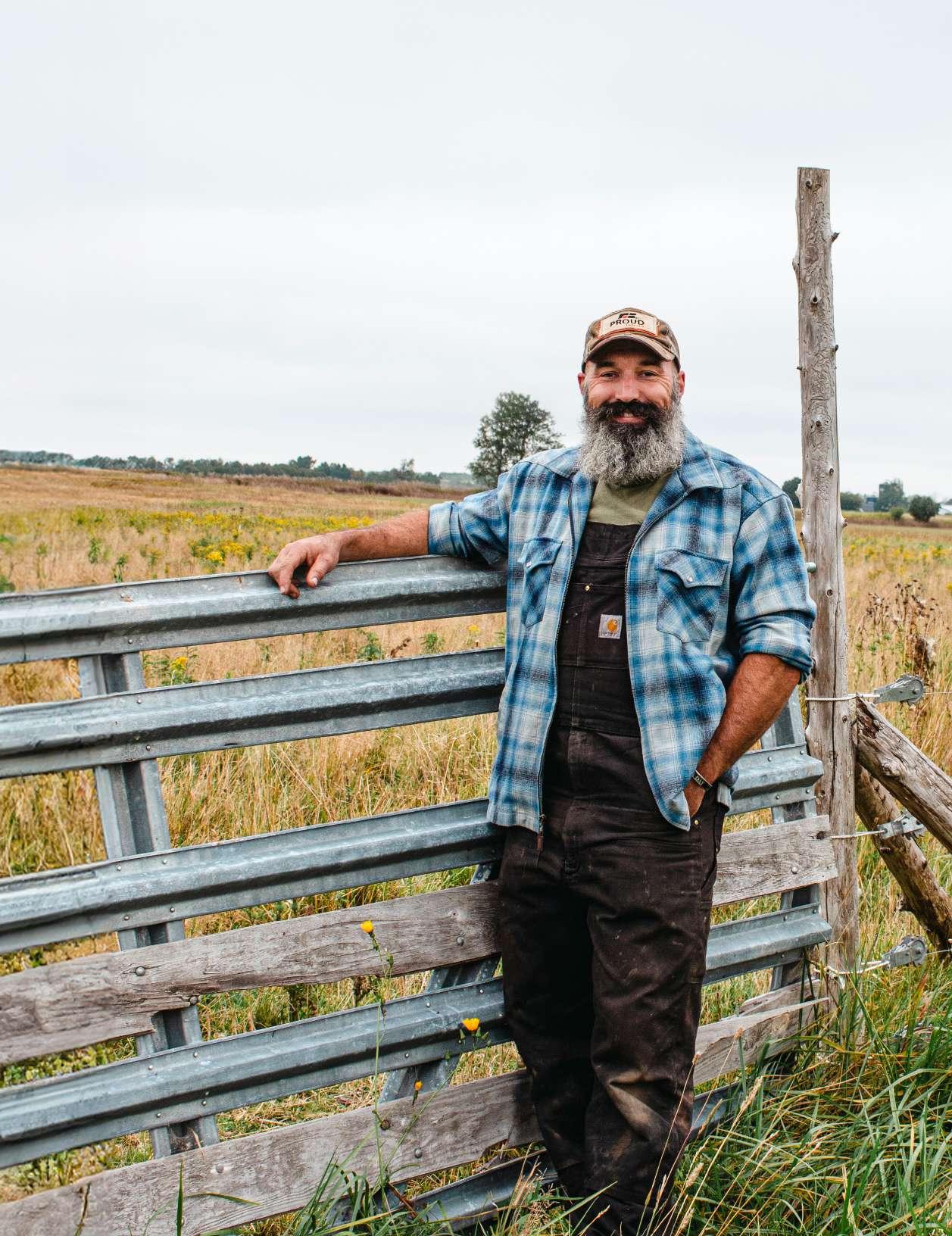
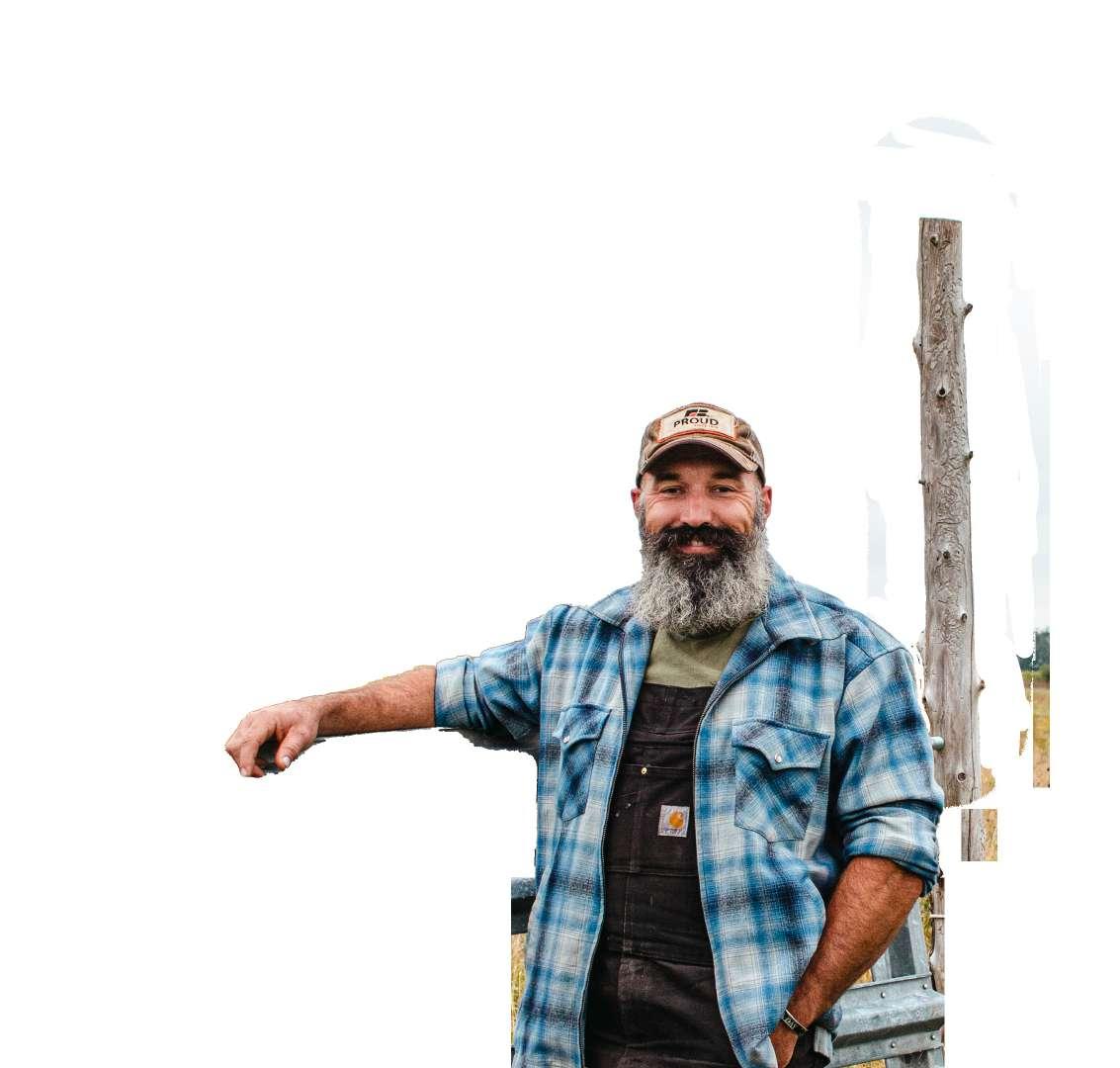

















































































































































Don’t wait to secure the hybrids and varieties proven to perform on your acres. FS InVISION® and FS HiSOY® offer elite genetics and consistent yield potential, matched with local expertise that makes all the difference.


Explore the FS InVISION and FS HiSOY advantage.



















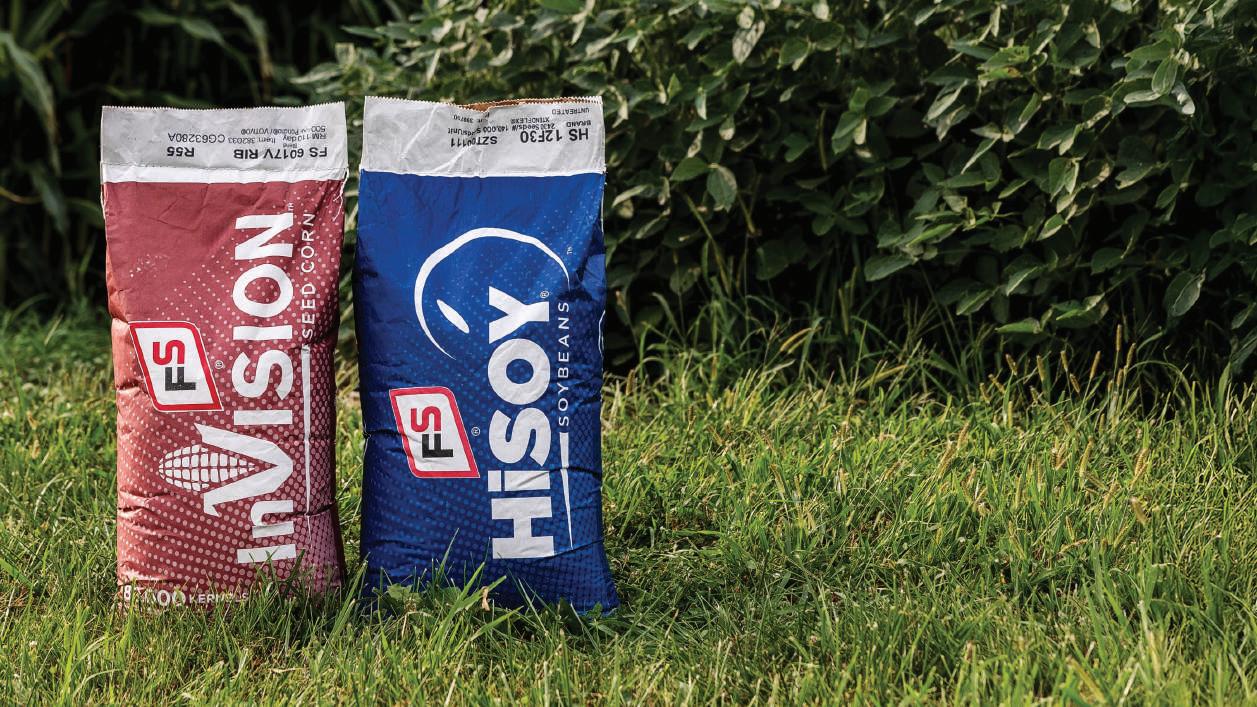

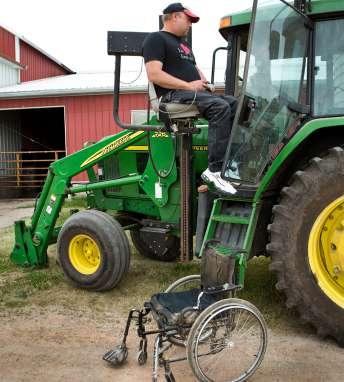


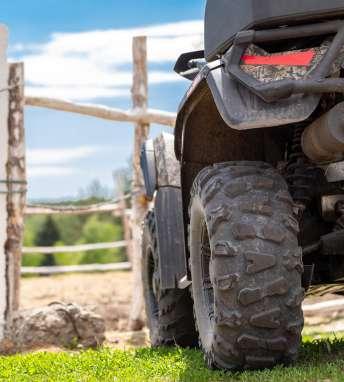
As the leading voice for Wisconsin agriculture, WFBF ensures that farmers’ concerns are heard and addressed, allowing you to focus on what you do best — feeding, clothing and fueling our communities.
Wisconsin Farm Bureau Federation champions policies that protect farmers’ rights, making sure that agriculture remains a thriving industry through proactive engagement at all levels of government.
Members gain access to leadership development, business resources and networking opportunities designed to help farmers expand their businesses and influence.
Through outreach and education, WFBF bridges the gap between farmers and consumers, promoting a deeper understanding of modern agriculture and its role in everyday life.
Members from across the state advocate for fair policies this fall.
Helping farmers continue farming after injury or disability.
Door County veteran builds community of healing through agriculture.
Meet the top individuals competing at this year's YFA Conference in December.
Dane County member saves on John Deere lawn mower purchase.
Learn more about this year's Heroes of Hope honorees.
Comments from Olson, Duvall, Cope and Riskedal.
County Farm Bureaus host safety trainings, learning opportunities and more.
GATHER AROUND THE TABLE
Flavorful spins for garden harvest staples.
See how your Giving Day contributions impact the future of agriculture.Fo
undation through auction donations. RURAL MUTUAL
Five safety practices for farmers working in grain bins.




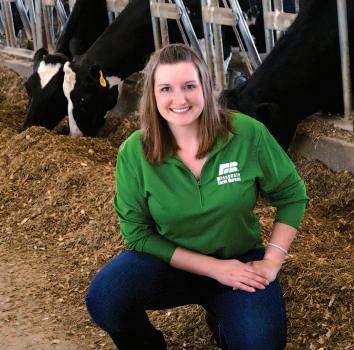
Ithinkone of the coolest things about growing up in a rural community is the way that people show up. Having a church potluck? People show up and bring the most amazing food. Having a community parade? You can bet there will be a long line of tractors and floats representing all the local groups. Had a life-altering incident happened? People who already have full plates will show up to help however they can and usually bring food. It's just what we do.
As I raise my own kids, I often reflect on my childhood and the experiences I had. The expectation to serve and be part of my community was a large part of my upbringing. I remember delivering soup to the elderly around Valentine’s Day, face painting at a community Halloween event and helping to clean the community center through 4-H.
But it wasn’t just the facilitated things. I remember a farmer who had a severe accident just down the road. The whole neighborhood showed up to help. People were in the field harvesting, people packed into the farmhouse kitchen to make meals and I
Some say that our service-forward culture is dying and in some ways I can see that view. But when I look around the state and see our Farm Bureau members giving their time and talents to not just to our organization but to many others, I have to think it’s not completely gone.
Farmers serve as first responders, firefighters, 4-H leaders and school board members. They are usually involved in more than Farm Bureau and generously give their small amount of time to causes in their communities.
This issue highlights those community efforts and Farm Bureau efforts. If everyone chips in the work isn’t heavy. Working together is a beautiful thing and something that I hope isn’t lost in future generations.
No matter what time of your life you are in, I hope you make time for yourself but also give time to a cause that matters to you. It’s needed and it’s appreciated.
Enjoy reading about many of our members who serve their communities but especially Jacob VandenPlas who is giving back to his community by supporting veterans. This feature story on page 10 will have you encouraged that we can make a difference when we work together.
As we head into the season of giving, know that your efforts are important and critical in keeping rural communities alive and well. Though it’s not always easy to give our time, it’s important we set the example that it’s what keeps our rural communities strong.
Wishing you a plentiful and safe harvest.
As always, thank you for reading.
Amy Eckelberg Rural Route Editor Wisconsin Farm Bureau Federation
Address of Publication
Wisconsin Farm Bureau Federation PO Box 5550 1241 John Q. Hammons Dr. Madison, WI 53705-0550
Postmaster: Send address changes to Wisconsin Farm Bureau Federation PO Box 5550 Madison, WI 53705-0550
Contact Information
608.836.5575
800.261.FARM (3276) wfbf.com info@wfbf.com
WFBF Board of Directors
Brad Olson, Frederic (President) Joe Bragger, Independence (Vice President) Jim Renn, Hartland Arch Morton Jr., Janesville Robert Nigh, Viroqua Pete Badtke, Ripon Dan Meyer, Kiel Brian Preder, Weyauwega Kim Bremmer, Loyal Steve Mueller, New Richmond (Promotion and Education Committee Chair) Kendall Riskedal, Johnson Creek (Young Farmer and Agriculturist Committee Chair)
Wisconsin Farm Bureau Federation’s Rural Route (ISSN 1082-1368) (USPS 39940), the official publication of the Wisconsin Farm Bureau Federation, is published six times per year in February|March, April|May, June|July, August|September, October|November and December|January. Subscription of $5 is included in Farm Bureau dues. Periodical postage is paid at Madison, Wisconsin. All rights reserved. No portion of this magazine may be reproduced in whole or part without written consent.
For advertising rates and information: Wisconsin accounts contact Slack Attack at 608.222.7630 or barbara@slackattack.com. National accounts contact Casey McNeal at 800.798.2691 ext. 334 or casey@iafalls.com. For general inquiries, contact Amy Eckelberg at 608.828.5706 or aeckelberg@wfbf.com.
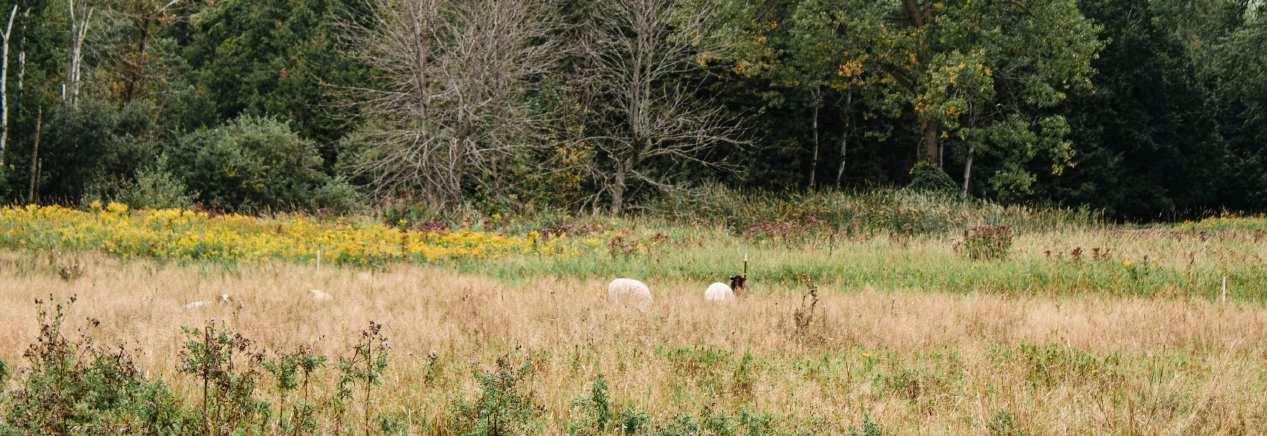
With kids back in school, football season underway and harvest around the corner, Wisconsin’s lawmakers are also gearing up for the fall legislative session. After a fraught but successful state budget, there are several policy priorities Wisconsin Farm Bureau hopes to see legislative action on before deer season.
Legislation has been introduced to create a $1.50 per gallon tax credit for production of Sustainable Aviation Fuel produced using domestic feedstocks. Wisconsin is well positioned to be a leader in this emerging market. Adding a producer incentive to our available feedstocks and proximity to major airports with Chicago and the Twin Cities would make Wisconsin an extremely attractive location to cite a production facility.
Legislation that would allow Wisconsin Farm Bureau to operate Farm Bureau Health Plans in Wisconsin is being introduced. This would add Wisconsin to fourteen other state Farm Bureaus that are currently allowed to offer these high-quality lower cost plans to members.
With another $150 million for the Agricultural Road Improvement Program included in the recent state budget, WFBF will be pursuing a technical modification to allow local governments which have not posted their roads, due to the importance of farming to their local economies, to become eligible to apply for ARIP grants by having their road inspected by a professional engineer to determine if the road has the capacity to support its agricultural traffic. This will avoid a perverse incentive for local governments to post roads in order to make them eligible for the program.
We continue to pursue changes to the wildlife damage abatement program to address increased farm losses from bears, cranes and other animals. A bill creating a hunting season for sandhill cranes and a program to help farmers cover the cost of seed treatments to discourage cranes from consuming the seedlings was introduced based on recommendations from a Legislative Council Study Committee, and a bill to address bear damage that passed in the State Senate last session but did not pass the Assembly awaits reintroduction.
WFBF is supporting a bill that was recently introduced, which would establish a Farmland Link Program in Wisconsin to connect farmland owners with prospective buyers looking to use the land exclusively for agriculture. Currently more than 30 states have a similar program which can serve as a central hub connecting landowners and retiring farmers with beginning or expanding farmers seeking land only for agricultural use. Under this bill, DATCP’s Farm Center may assist with farmland transfers, partner with nonprofits to connect participants and share educational materials about the program.
WFBF hopes to see the passage of two bills that would provide liability protection and assistance for farmers who allowed spreading of municipal biosolids that, unbeknownst to them, may have contained PFAS chemicals. The state set aside $125 million to assist innocent landowners with cleanup and water filtration, but the Governor and legislators have yet to agree on the details of such a program to use the funds or the liability protections for farmers.
Additionally, WFBF’s Government Relations Team is continuing to work this legislative session toward tackling important issues such as improving the efficiency of grain hauling, clarifying requirements for agricultural commercial motor vehicles, establishing guardrails for utility-scale solar projects in agricultural areas, protecting Wisconsin farmland, and supporting beginning and expanding farmers.
These policy items reflect both ongoing challenges and emerging opportunities for farmers and all of Wisconsin agriculture.
WFBF will continue working with lawmakers to ensure that farm families have the tools, protections and support they need to thrive.


Farm Bureau leaders from across Wisconsin traveled to Washington, D.C. September 15-17, to meet with the state’s Congressional delegation.
Members advocated for the delisting of the grey wolf, passage of a farm bill, labor reform, sustainable aviation fuel, year-round E15 and pro-agriculture trade opportunities.
“It’s incredible to see how we as members can work with our legislators to influence policy that impact us back home,” said Lincoln County Farm Bureau member Jessica Gruetzmacher. “I appreciate the opportunity to see things from a different perspective and getting to know other farmers from across the state of Wisconsin.”

In addition to Congressional visits, Wisconsin Farm Bureau members also met with officials from the Federal Motor Carrier Safety Administration and the America First Policy Institute.
WFBF Board Directors on the trip included: Pete Badtke, Ripon; Dan Meyer, Kiel; Arch Morton, Jr., Janesville; Steve Mueller, New Richmond; and Brian Preder, Weyauwega.
Member leaders joining the board members included: Tony Christopherson, Elk Mound; Steven Earleywine, Brodhead; Doug Schulz, Iron Ridge; Nicholas Retzlaff, Ripon; Tyrone Tutland, Mason; Levi Bratt, Saint Nazianz; Cullen Schlewitz, Eau Claire; Dan Fremstead, Whitehall; Terrance Beck, Oshkosh; John Fischer, Plymouth; Jessica Gruetzmacher, Merrill; Don Lutz, Scandinavia; Melissa Yates, Merrill; Kent McClurg, Viroqua; and Tammy Wiedenbeck, Lancaster.
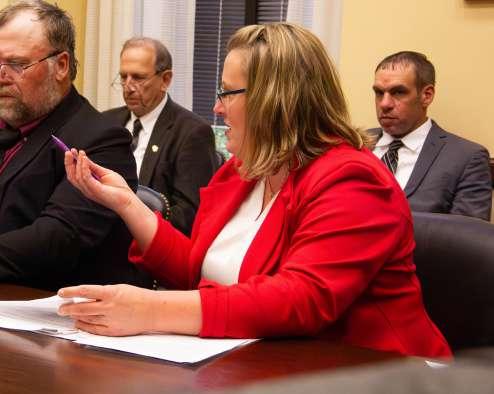

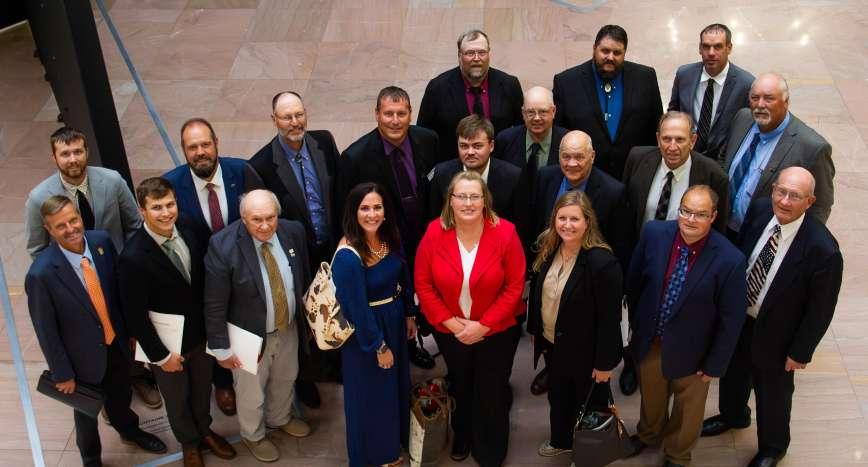
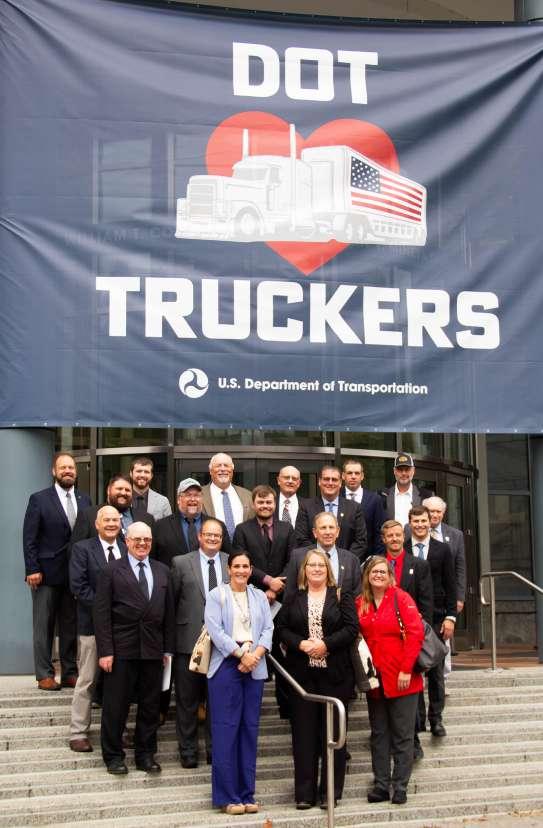
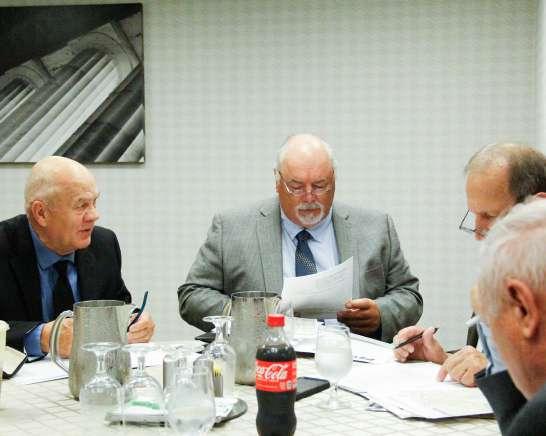
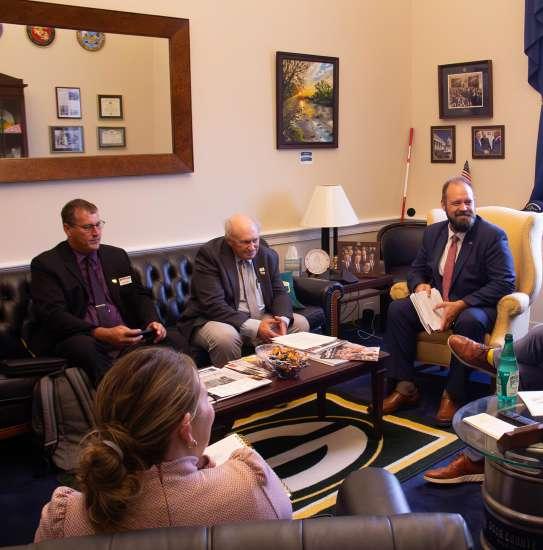
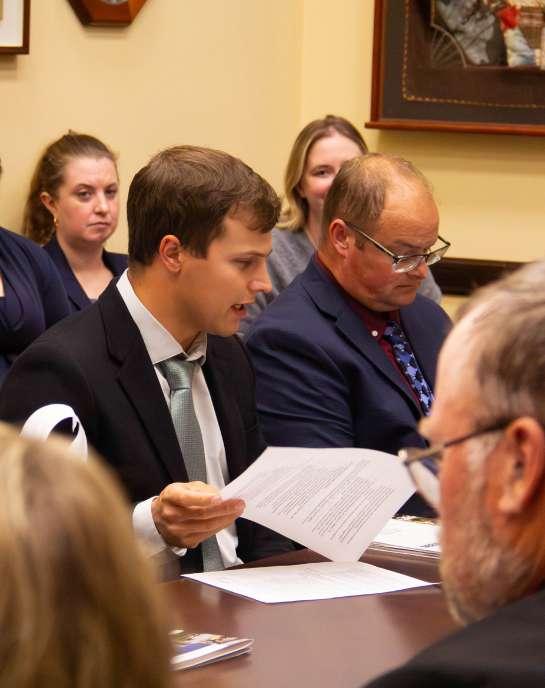
By Emily O'Brien
As the seasons shift in Wisconsin and rural life begins to change with harvest, so does civic engagement. Fall is not only for sweaters and pumpkins, but also when political advocacy is in full swing.
Volunteers for Agriculture® (VFA) is the political action committee for Wisconsin Farm Bureau Federation. VFA is run by a committee that is dedicated to representing the interests of farmers and rural communities. Since 1990, the VFA has helped elect candidates who work for agriculture’s interests in Madison.
VFA is not just a PAC; it is a committee made up of farmer members, who understand the challenges that agriculturists face every day. The committee’s members decide who to make campaign contributions to, interview candidates and carefully weigh their endorsement decisions.
VFA plays an essential role in supporting candidates who back agriculture. They engage directly with the political process, to ensure that agriculture and rural communities have the proper representation and resources to continue their livelihoods.
What sets apart VFA from other PACs is how deeply rooted our grassroots, member-driven structure is. VFA oversees and directs Farm Bureau’s political advocacy and engagement. Political candidates are evaluated by the committee on a variety of criteria, including input from county Farm Bureaus.
Our membership represents a wide range of commodities, from cranberries to beef and dairy to potatoes, that span every corner of the state. The diversity of our membership goes beyond agriculture: our members hold a variety of political beliefs. However, when it comes to advocating for rural Wisconsin, they stand united with those who stand with farmers.
It has been noted that collective giving has more influence than various individual donations. Lawmakers are more inclined to pay attention to organizations with a strong and active PAC, because they represent not just financial backing, but an engaged and unified constituency.
A PAC allows likeminded individuals to participate in the political process beyond their civic duty. When lawmakers receive an endorsement or financial contribution from VFA, they know it is backed by a network of hardworking constituents. Members serving on the VFA are real voters who care deeply about issues like farmland preservation, water quality and rural infrastructure.

Plus, VFA endorsements come with proven results. Election after election, over 90% of VFA-endorsed candidates win their general election.
The VFA builds strong relationships with legislators in both parties, helping Wisconsin Farm Bureau achieve its legislative priorities. VFA is the leading farm-related, rural-focused PAC in Wisconsin, supporting a diverse range of candidates who fight for farm families.
Political action committees like VFA allow individuals to go beyond their civic duty to have tangible impact on the policies that shape their lives. Voting is important, but adding a contribution to a PAC amplifies that vote with a clear message that agriculture matters, farmers are paying attention and participating in the process in a meaningful way.
As we move forward into this next season, let’s continue to utilize the power of a united voice for agriculture. Whether you have been a lifetime member of Farm Bureau or are new to the organization, consider how you can be a part of VFA’s important work. With your support, we can continue to advocate for strong and sustainable rural communities and ensure that the voice of agriculture is heard loud and clear in Wisconsin and beyond.
For more information on the VFA and ways to support their cause, visit wfbf.com/policy/vfa.

Ag Day at the Capitol will take place on Wednesday, January 21, 2026
Registration information and full details will be released in fall 2026.

AgrAbility of Wisconsin has been helping farmers and their families continue working in agriculture while living with a farm injury or disability since 1991. As a partnership between UW-Extension and Easter Seals Wisconsin, AgrAbility has supported more than 3,400 farmers in staying active and successful on the farm.
Farming is one of the most hazardous occupations in the U.S., and in Wisconsin alone, more than 4,000 farm injuries occur each year, with many leading to permanent disabilities. AgrAbility works directly with farmers and farm families to provide confidential, on-farm support to help connect them with solutions.
One key tool is assistive technology. This includes anything from simple, low-tech fixes to advanced equipment that makes daily tasks safer and less strenuous.
• Grain gauges that allow you to check your grain level without climbing inside.
• Grip hooks to make carrying heavy items like buckets easier.
• Tractor steps with handrails which help you to easily access equipment and reduce stress on joints.
• Bump ‘n Drive gates that open and close without having to get out of your vehicle.
Each farmer’s situation is unique. AgrAbility staff create a customized plan at no cost, including:
• On-site assessments to identify barriers at work or home.
• Recommendations for adaptive tools or modified work practices.
• Education and training opportunities
“Make that call to AgrAbility. A lot of farmers feel that it’s a handout or a welfare, and I just tell them, you were farming for how many years? You always had government programs on the farm. You didn’t turn that down. This is no different. If they can make it easier for you, you’ll enjoy your job a lot better.” – Jim Zell
“Go through the program, you got nothing to lose. It’s only your time if you come out with nothing. Anything you get is to the positive. If you can make your life easier, even if it’s only for five minutes a day, that’s 35 minutes a week, it adds up quick. Go through it, you got nothing to lose.”
– Gary Stankowski
“The one thing that I will say is that you need to somehow, someway find some hope. Because at the end of the day, after you go through something like that, you will get better and it'll get to a point where you just have to level with it. Now I sit here and say this, and I'll be the first one to say it's still hard for me to level with it, but once you level with it, you gain your happiness back and you just you, you deal with it, you accept it and you gotta move on.”
– John Mitchell
Learn more about how AgrAbility can serve you at agrability.bse.wisc.edu.
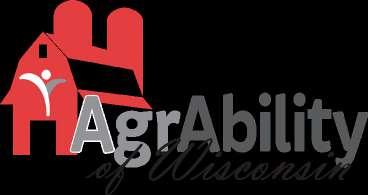
• Connections to financial, rehabilitative or educational resources.
• Peer support with other farmers who have faced similar challenges.

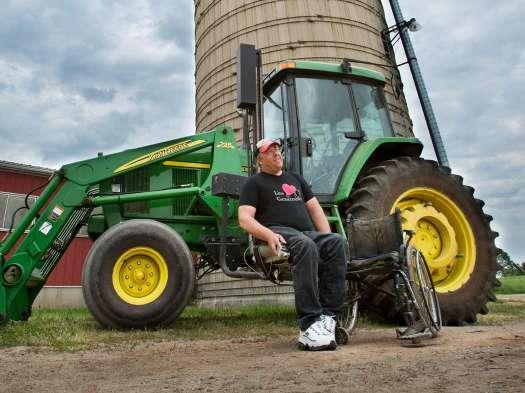
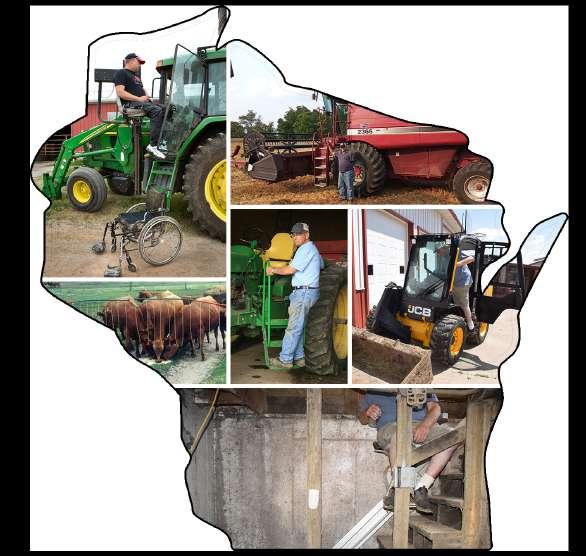



Jacob’s second tour was cut short as he was med flighted out with a traumatic brain injury, spending time recovering in Germany and later at Walter Reed and Fort Bragg before having the clearance to return home. Little did he know that the hardest part of his deployment was still ahead of him.
“When you hang up the hat of active duty and put on the hat of being a veteran, you experience a tremendous amount of loss,” Jacob said. “You lose your job, your housing, your friends that have become family – you lose
Skills gained in the infantry do not translate smoothly into civilian life. While he continued to serve in the National Guard until 2014, shifting to civilian life left a hole that was difficult to fill. He missed the brotherhood of training and combat that no job was able to replace. Despite a wealth of skills obtained through his service, Jacob struggled to find a job and even spent time homeless as he tried to rebuild his life after war.
“I had accomplished my life goal by the age of 21,” Jacob said. “Now I had to figure out what to do with the rest of my life because, honestly, I never expected to make it back home. It took years to stop living day-to-day and start looking ahead to the
Years later, while studying environmental science at UW-Green Bay, Jacob discovered the positive impact a quality diet can have
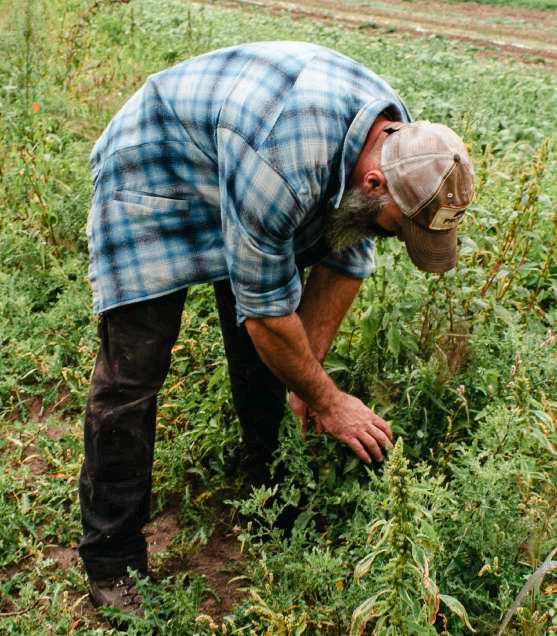
“Your mental health begins with the quality of food you are consuming,” Jacob said. “If your body is feeling good, it gives you the extra edge it
needs to combat mental health
This mindset drew Jacob to a 40-acre farmette in Door County that he and his wife, Emily, purchased in 2018. He found the things he enjoyed most about serving his country were also true in
“As a soldier, you are not working a typical 9-5 job; you are working until the mission is complete,” Jacob said. “Something very similar can be said about farmers.”
In 2021, Jacob established DC Farm to Vets, a nonprofit whose mission is serving veterans and first responders through agriculture and sustainability. The nonprofit was inspired by Victory Gardens during the world wars when your civic duty was to grow food and share it with your neighbor.
DC Farm for Vets has helped veterans get started farming, plant gardens and learn skills like food preservation to benefit their lives
The nonprofit was started after farming helped Jacob conquer his own struggles.
“After two to three
years of farming, I saw a significant impact on my mental health and how it improved my life with the struggles I have from being overseas,” Jacob said.
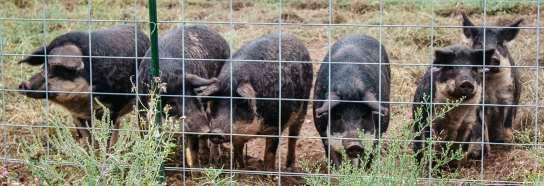
Jacob shared that a sense of community is something veterans crave when they return to civilian life. The loss of community paired with post-traumatic stress disorder and other mental health challenges have had a lasting impact on veterans across generations. According to the study "Operation Deep Dive", those challenges have led to a staggering 44 veterans who die by suicide per day in the United States.
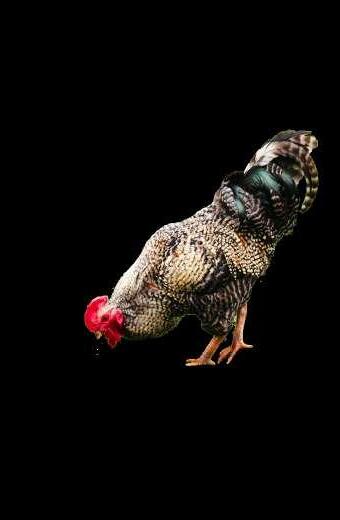
With DC Farm for Vets, Jacob saw a way to give veterans a place to connect and support one another.
“Wherever you go, community is built around food,” Jacob said.
Every Thursday night, Jacob hosts an evening harvest party where veterans and volunteers participate in an activity on the farm and learn something they can do at home or on their own farms. Afterwards, they enjoy a good meal and sit around the fire, facilitating an informal feeling of therapy where they can open up and talk about their struggles.
“Soldiers are inherently wired to serve something bigger than themselves,” Jacob said. “DC Farm for Vets opens the door for me to talk about my own struggles, even when it is difficult to do so, while letting people know it is okay to talk about theirs as well.”
If you are looking for a way to support veterans in your area, Jacob said the biggest thing is to ensure veterans are participating in veteran organizations like DC Farm for Vets and regularly checking in on them.
“No matter where you are, just calling a veteran you know and checking in on them is the best support you can give,” Jacob said. “No one knows just how much weight it carries to simply hear someone ask, ‘Are you okay?’ or ‘How have you been?’”
As he looks in the eyes of fellow veterans around the fire on his farm, Jacob is proud of the impact of DC Farm for Vets and looks forward to the impact that lies ahead.
“I found my own peace and harmony in growing food and being in agriculture,” Jacob said. “It feels a lot like home and that, for me, is pretty awesome.”

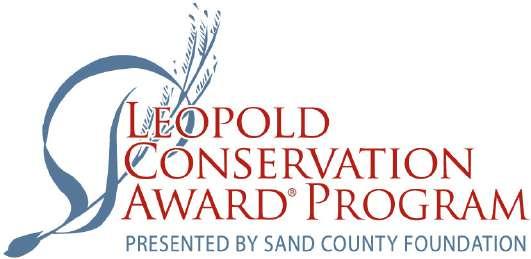
Four finalists have been selected for the 2025 Wisconsin Leopold Conservation Award® . The award honors farmers and forestland owners who go above and beyond in their management of soil health, water quality and wildlife habitat on working land.
Named in honor of renowned conservationist Aldo Leopold, this award recognizes landowners who inspire others with their dedication to environmental improvement. In his influential 1949 book, A Sand County Almanac, Leopold advocated for “a land ethic,” an ethical relationship between people and the land they own and manage.
Sand County Foundation and national sponsor American Farmland Trust present Leopold Conservation Awards to private landowners in 28 states. In Wisconsin the $10,000 award is presented with state partners: Wisconsin Farm Bureau Federation and Dairy Farmers of Wisconsin.
The Finalists Are:
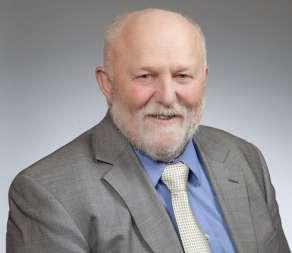
Andy Bensend of Dallas in Barron County:
Andy Bensend has seen measurable gains in soil health, water retention, and biodiversity at AB Farms. Despite northern Wisconsin’s shortened growing season, he grows cover crops which complement nutrient management and uses reduced tillage practices used to raise corn, soybeans, and winter wheat. In addition to collaborative and self-driven onfarm research projects, he is a member of Farmers of Barron County Watersheds and serves on Wisconsin Farm Bureau’s Sustainability Committee.
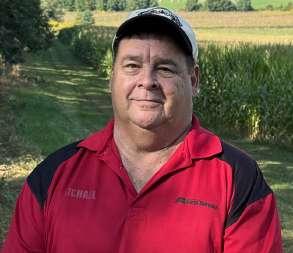
Michael Berg of Blanchardville in Lafayette County:
The Berg family has practiced no-till and grown crops on contour strips since the 1970s. They have since installed terraces and nearly one mile of streambank riprapping to prevent soil erosion into the Pecatonica River. This effort to improve water quality and fish habitat as done in collaboration with local municipality, county, watershed, and state entities as part of Wisconsin’s Water Quality Trading Program. The Bergs rotationally graze beef cattle and have planted about 25,000 pine and walnut trees on marginal lands.
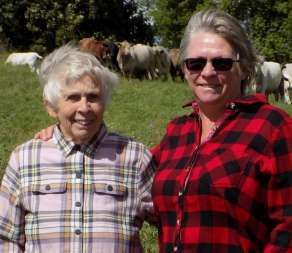
Brattset Family Farm of Jefferson in Jefferson County:
Mother and daughter, Weenonah Brattset and Kirsten Jurcek, have rotationally grazed beef cattle since 2005. Integrating cropland into perennial vegetation has produced quality forage while improving soil health, water quality, and biodiversity. Their commitment to improving grazing practices while enhancing grassland bird habitat includes mentoring other graziers and partnering with the National Audubon Society.
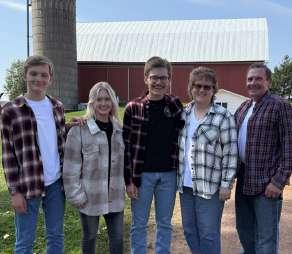
Pat and Michelle Socha of Edgar in Marathon County: While growing crops, the Sochas utilize precision technology, no-till practices, and cover crops to reduce erosion and prevent nutrient losses. Buffer strips and a pollinator plot promote biodiversity. To manage timber production and wildlife habitat, selective harvests are carefully timed every 15-20 years without clear cutting. Pat is a founding member and board member of Eau Pleine Partnership for Integrated Conservation.
Wisconsin landowners were encouraged to apply, or be nominated, for the award. An independent panel of agricultural and conservation leaders reviewed the applications. This year’s recipient will be revealed at the Wisconsin Board of Agriculture, Trade and Consumer Protection meeting November 13.
The Wisconsin Leopold Conservation Award is made possible thanks to the generous contributions from American Farmland Trust, Dairy Farmers of Wisconsin, Wisconsin Farm Bureau Federation, Sand County Foundation, Culver’s, Compeer Financial, USDA Natural Resources Conservation Service of Wisconsin, Wisconsin Corn Growers Association, Wisconsin Corn Promotion Board, Wisconsin Land and Water Conservation Association, and Wisconsin Potato & Vegetable Growers Association.
For more information on the award, visit www.leopoldconservationaward.org.


The finalists have been named for Wisconsin Farm Bureau’s Young Farmer and Agriculturist Farming for the Future and Outstanding Agriculture Professional Awards.
Four finalists in each category will compete for top honors at the WFBF Young Farmer and Agriculturist Conference in December.
The Farming for the Future Award recognizes YFA members who excel in their farm involvement, future goals, leadership abilities and participation in Farm Bureau and other civic and service organizations. Applicants must derive a majority of their income from on-farm production.
“These finalists represent the next generation of bold, business-minded farmers who are deeply committed to growing Wisconsin agriculture,” said WFBF President Brad Olson. “Their leadership and vision are helping shape the future of farming in our state.”
THIS YEAR’S FINALISTS FOR THE FARMING FOR THE FUTURE AWARD:
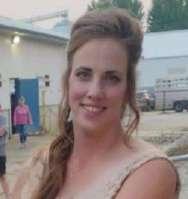
Stephanie and her husband, Keith, and their three children, Theodore, Maureen and Oliver, operate a 260 cow registered Holstein and Guernsey farm in Coleman. They raise 400 head of heifers and steers along with growing all crops needed for the animals. Stephanie also does part time nutrition consulting work for Rio Creek Feed Mill out of Algoma.
Door County
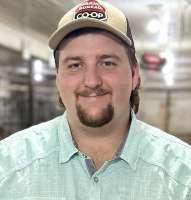
Austin is in the process of buying Vandertie’s Doorco Farms from his parents. Located in Brussels, Austin manages the farm’s 40 registered Holsteins, putting an emphasis on genetics which has recently made him competitive in the international embryo market. Additionally, he cares for all the youngstock and runs 400 acres of cropland in which he grows alfalfa, corn, soybeans and winter wheat.
Vernon County

Cosette and her husband, Eldon, reside outside of Viroqua with their children Dwain, Emmett, Everett and Colleen.
Cosette manages her family’s dairy farm where they also raise corn, soybeans, alfalfa and cover crops.
Vernon County
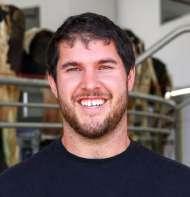
William farms in partnership with his parents at his family’s dairy, Wall-Stone Holsteins LLC, in De Soto. The farm milks 1,500 cows and farms 2200 acres. William oversees the cropping program, nutrient management, permitting, construction projects, and is active in herd management and farm finances. He is actively involved in building the long-term strength of the operation through herd genetic development and on-farm infrastructure development.
The Outstanding Agriculture Professional Award recognizes YFA members who excel in their agriculture involvement, leadership abilities and participation in Farm Bureau and other civic and service organizations. Applicants are agriculturists who derive a majority of their income from an off-farm job.
Green County
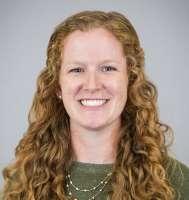
Amy serves as an Ag & Business Relationship Manager at Lake Ridge Bank, where she works closely with farmers and business owners to meet their financing needs. Amy has been an active member of Green County Farm Bureau since 2017 and has held multiple leadership roles on the board of directors.
Manitowoc County
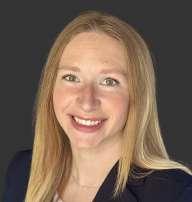
Kelly is the State Farm Law Outreach Specialist for the University of Wisconsin-Madison. She is part of the fifth generation on her family’s farm and a licensed attorney. In addition to her involvement with Manitowoc County Farm Bureau, Kelly is active at the state and national levels as a member of the WisGO Team and a two-time national finalist in Discussion Meet.
Jackson County
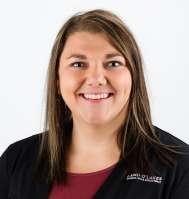
Savannah is the Senior Plant Manager at Land O’ Lakes Animal Milk Solutions overseeing operations at both the Black River Falls and Union Center facilities. She provides strategic leadership across all plant operations and plays a pivotal role in shaping talent development through her oversight of the Reverse Mentorship Program. Beyond her professional responsibilities, Savannah is deeply engaged in agricultural advocacy and community service.
Chippewa County
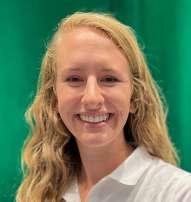
Maddie is the Pioneer Seeds Territory Manager in northwest Wisconsin. She serves as Vice President of the Chippewa County Farm Bureau along with serving as the YFA chair for the county. Maddie found her passion for agriculture through the National FFA Organization at a young age and continued involvement with other ag organizations such as Agriculture Future of America (AFA) and Farm Bureau.
“These
young professionals are leading with purpose and making a difference far beyond the farm gate,” said Olson. “Their passion and drive continue to strengthen the future of Wisconsin agriculture.”
Each finalist will conduct an interview with judges at the 2025 WFBF Annual Meeting and YFA Conference at Kalahari Resorts in Wisconsin Dells, December 5-7. The winner of each award will receive $1,500 courtesy of GROWMARK, Inc.; the opportunity to attend the 2026 American Farm Bureau Federation Young Farmers & Ranchers Leadership Conference in Portland, OR; will be eligible to participate in the 2027 YFA Washington, D.C. Fly-In; and be a guest of WFBF at the 2026 YFA Conference. The total value of the prize package is more than $5,000.
The Wisconsin Farm Bureau Foundation co-sponsors these awards with GROWMARK Inc. and Rural Mutual Insurance Company. Information about all YFA contests can be found on wfbf.com. .
The Discussion Meet provides YFA members with the chance to demonstrate their speaking skills on agriculture-related topics. Contestants are judged on their problem-solving skills as they discuss timely topics with their colleagues. Each of Wisconsin Farm Bureau’s nine districts held a competition where the following contestants were chosen to advance to the state competition held at the WFBF Annual Meeting and YFA Conference at the Kalahari Resorts and Conventions in Wisconsin Dells, Dec. 5-8.











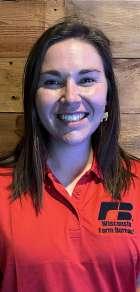











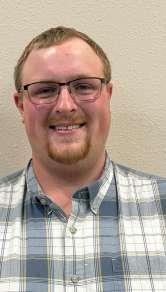

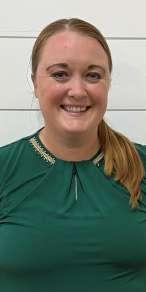


In accordance with the bylaws and pursuant to the direction of the Board of Directors, the undersigned Secretary hereby gives notice that the Annual Meeting of members of the Wisconsin Farm Bureau Federation, Cooperative, will convene on Sunday, Dec. 7, at 3:30 p.m. at the Kalahari Resorts and Conventions in Wisconsin Dells, Wisconsin.
- Bradley Uken, Secretary
In accordance with the bylaws and pursuant to the direction of the Board of Directors, the undersigned Secretary hereby gives notice that the Annual Meeting of members of the Rural Mutual Insurance Company will convene on Sunday, Dec. 7, at 3:30 p.m. at the Kalahari Resorts and Conventions in Wisconsin Dells, Wisconsin.
- Bradley Uken, Secretary
For most up-to-date information regarding the WFBF Annual Meeting, visit wfbf.com/events/annual-meeting-yfa-conference.



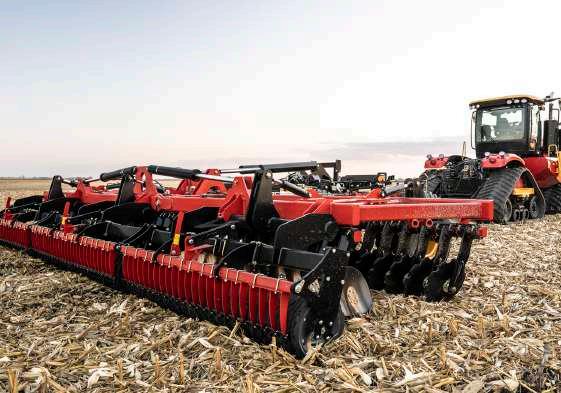

Dominate your residue with the Versatile Fury. Fast and flexible, the Fury is designed to cut, chop, size and mix your residue at speeds of 5-12 mph (7.5-20 km/h).
Dominate your residue with the Versatile Fury. Fast and flexible, the Fury is designed to cut, chop, size and mix your residue at speeds of 5-12 mph (7.5-20 km/h).
Dominate your residue with the Versatile Fury. Fast and flexible, the Fury is designed to cut, chop, size and mix your residue at speeds of 5-12 mph (7.5-20 km/h).






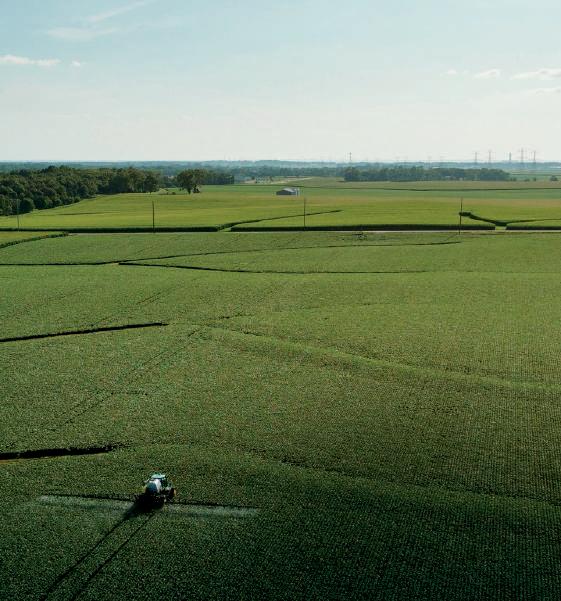


The Fury has a narrow 12’ transport width and is fully configurable adapting to any field condition with a choice of blade sizes and three rear finishing attachments.
The Fury has a narrow 12’ transport width and is fully configurable adapting to any field condition with a choice of blade sizes and three rear finishing attachments.
www.versatile-ag.com
The Fury has a narrow 12’ transport width and is fully configurable adapting to any field condition with a choice of blade sizes and three rear finishing attachments.
www.versatile-ag.com
www.versatile-ag.com



















*WFBF member benefits may be changed or discontinued at any time without notice.* Learn more about your Farm Bureau member benefit savings by scanning the QR code or visiting wfbf.com/membership/member-benefits.


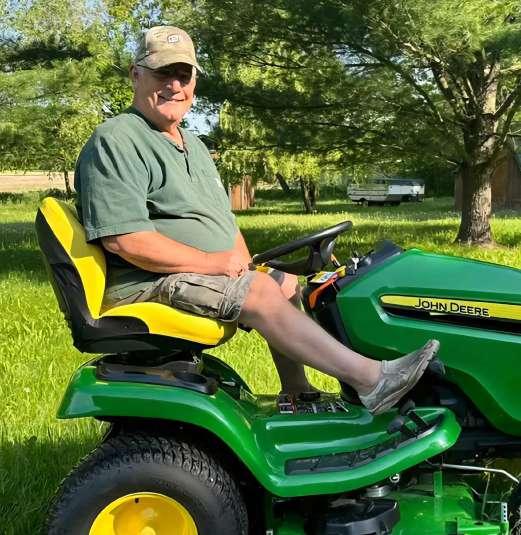
Dane County Farm Bureau board member and lifelong member Sam Skemp understands the advantages of Wisconsin Farm Bureau member benefits. As a retired agriculture professional with 43 years of experience, Sam knows value when he sees it and that’s exactly what he’s found with the John Deere member benefit.
“I purchased a John Deere riding lawn mower that I will use at my cabin. This is the second mower that I purchased with the Farm Bureau discount. I had purchased one earlier for mowing at home,” Sam said. “Both times, it was very easy. The dealership took the discount off the price and I saved $50 each time, for a total of $100.”
Wisconsin Farm Bureau members can sign up to receive an automatic John Deere Rewards membership upgrade to Platinum 1, unlocking exclusive discounts on select equipment. Platinum 1 members will also receive monthly offers for rewards-exclusive discounts on parts, merchandise and more.
Savings include $200–$1,700 off commercial mowing equipment, $50–$150 off residential mowing equipment, $100–$300 off utility vehicles, $200–$300 off tractors and $550–$1,400 off compact construction equipment.
“I have been a Farm Bureau member for more than 50 years and the benefits they offer are a great deal,” Sam added. “I have used them for traveling with hotel stays along with other opportunities. The benefits are there for Farm Bureau members to take advantage of.”
With Sam’s lifelong connection to agriculture and active role in Farm Bureau, he has seen firsthand the value of membership.
“I’m proud to be a Wisconsin Farm Bureau member because of all the support they provide for the ag industry,” Sam said. “The benefits make membership even more valuable.”

For more information about this benefit or to learn more about other discounts, visit wfbf.com/membership/ member-benefits
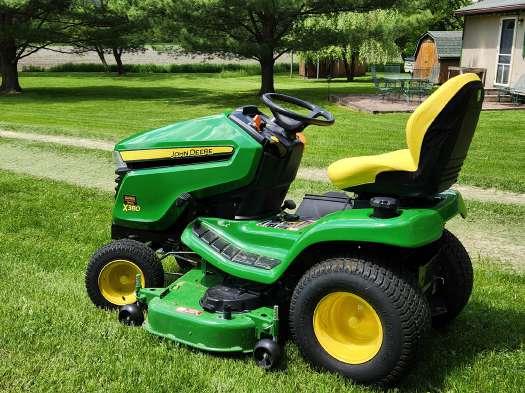

Heroes of Hope, under the Farm Neighbors Care campaign, has introduced us to remarkable people who are quietly making a difference in their communities. Each story has shown us that hope doesn’t always come in grand gestures but often shines through in everyday acts of kindness, compassion and connection.
From lending a listening ear, to creating programs that bring people together, to simply showing up when someone needs support, our heroes remind us that community is built on care. Their dedication has uplifted neighbors, strengthened relationships and inspired others to do the same.
Join us in celebrating these ordinary people doing extraordinary things to spread hope across Wisconsin’s rural landscape. Here is what their nominators had to say:

“When a tornado struck a neighbor’s farm, Mark was one of the first to show up. He immediately stepped in to help round up and relocate cattle—working alongside the family until 3 a.m. His support didn’t stop there. In the days that followed, Mark continued to show up—cutting wood, lending a hand and doing whatever was needed to help this family start rebuilding. His selfless actions in their time of crisis truly embody what it means to be a Hero of Hope.”

“Karen truly embodies the spirit of hope. She has been a guiding light in the effort to break down the stigma around mental health in agriculture and works every day to make sure farmers know they are never alone.”
“Joeisthekindofneighboreveryonehopesfor—always readytolendahandonthefarmanddeeplyinvolved inhiscommunity.Fromsupportingfellowfarmersto servinginthechurch,firedepartmentandKnightsof Columbus,Joeandhiswifeembodygenerosity.Theyeven helplocalyouthbyprovidingpigstoshowatthefair.”

KyleNilsestuen–TrempealeauCounty faced“WhenpoultrygrowersinwesternWisconsin hesitation.suddenuncertainty,Kylesteppedupwithout Hehelpedfarmerssafelymanagetheir flocks,connectedthemwithmediaandbecamea apowerfulvoiceadvocatingforlong-termsolutions.As BureaudedicatedmemberoftheTrempealeauCountyFarm agricultureboard,KylecontinuestochampionWisconsin everyday.”

“Al is a dedicated farmer whose compassion and selflessness make him a true Hero of Hope. Having experienced the hardship of losing everything and rebuilding from the ground up, he now devotes himself to helping others grow and succeed, especially young farmers. Whether it's organizing a community harvest for a grieving family, planting crops for the local fair or renting out his equipment to those in need, Al is always the first to lend a hand. His support goes beyond farming, offering a hug, a listening ear or a thoughtful strategy session when it’s most needed. Al exemplifies the spirit of resilience, generosity, and hope in agriculture.”

Know an ordinary person doing extraordinary things for others in your community?
Nominate them today for the monthy feature at https://bit.ly/FNCHeroHope
(Cut it out, hang it up, pass it along!)
1. Farmer 24/7 Wellness Hotline | 888.901.2558 | Experienced Stress Counselors provide immediate, in-the-moment care for farmers and farm families.
2. Veterans Crisis Line | 800.273.8255 and press 1
3. Kids in Crisis | 203.661.1911 | Specialized for kids and teens in crisis.
Rural Realities Podcast – conversations about farm stress, family and finding balance
Peer Support Groups – organized by the Wisconsin Farm Center
Farm Neighbors Care – resources for helping you and your neighbors from WFBF
Farm State of Mind – resources for helping you and your neighbors from AFBF
Local Support Contacts
Neighbor/Friend:
Doctor/Clinic:
Pastor/Advisor:
If you or someone you know needs immediate assistance, call or text 988.
Hang this on a wall, fridge and/or bulletin in your home, shop or barn. Share a copy with two neighbors, because wellness grows when we look out for each other.
Immediate assistance
Call or Text 988
WI Farm Center 24/7 Hotline
888.901.2558
Text FARM to 741741
Keep in your wallet. Share with a friend.






Whenpeople think about farmers, the first image that comes to mind is someone in the field planting, harvesting or milking cows. While that is all true, there is so much more to our Farm Bureau members. We are community leaders, mentors and neighbors. Farm Bureau members make lasting impressions in and around their local communities.
Farm Bureau members provide education on agriculture with programs like Agriculture in the Classroom, teaching students lessons about food, farming and the natural resources used in agriculture. Whether inviting visitors to their farm, helping them plant seeds in a cup or showing them how milk gets from the farm to the store, our members are at the forefront helping others learn about their way of life. With fewer farmers, the work our members do every day to bridge the gap between them and consumers is second to none.
Without supporting the next generation, we will be left behind. That is why Farm Bureau is a strong supporter of students going into agricultural careers with scholarship programs as well as in careers that value rural areas. From leadership training to speaking contests and support for FFA and 4-H, our members are there to help plant the
seeds that ensure a bright future for our young people.
Our members are active in their communities for example: local dairy breakfasts in June with pancakes, sausage and, of course, milk, cheese and sometimes even ice cream. From first aid training to farm safety to food drives, if someone is doing it, it is more than likely that Farm Bureau members are involved.
Many
of our Farm Bureau members serve their communities by sitting on their town, county, school and church boards. The willingness of our members to serve in these positions ensures that rural voices are
not
forgotten.
Remember, everyone
can make a difference.
Farm Bureau members are stewards of the land, from conservation practices to nutrient management practices that keep water and soil clean and healthy, Wisconsin farmers use technology and innovation to ensure clean water, fertile soil and abundant resources for the next generation. We have many members who are leaders in their local farmer-led watershed groups.
I am proud of our members and how they step up for causes important to them and I’m pleased so many give their time and talents to Farm Bureau. Know that your work and dedication do not go unnoticed.
Farm Bureau members across our state serve in every way imaginable and for that I say thank you and keep up the great work.
Olson was first elected President of Wisconsin Farm Bureau in 2023. He is a crop farmer near Frederic in Polk County.
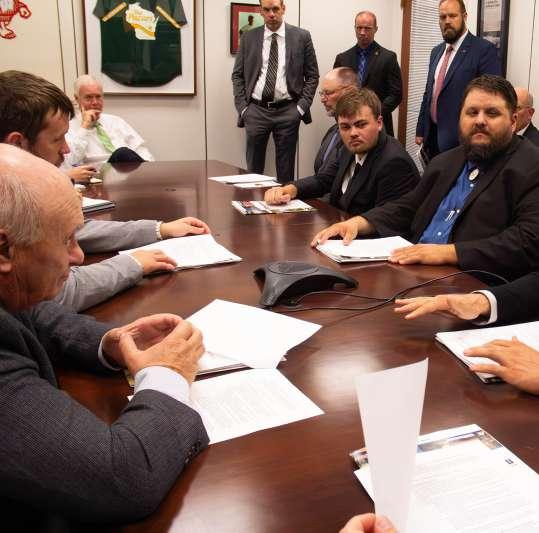
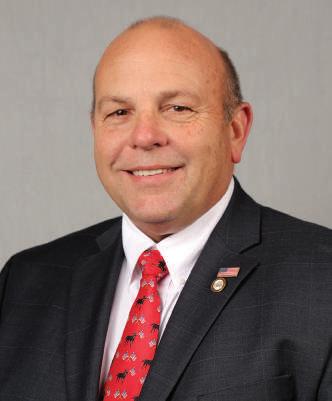
Hundreds of thousands of families in America are touched by cancer every year. My family is no exception. I think we can all agree that the goal of improving health outcomes is a worthy goal, and it is supported by America’s farmers and ranchers.
Farmers are dedicated to growing safe and nutritious food for all of America’s families. We know that healthy lives are fueled by healthy meals, and those start on the farm.
The Make America Healthy Again, or MAHA, movement has the stated goal of addressing the causes of illness in the U.S., and it’s generated a lot of interest in how our food is produced. We welcome the discussion and the renewed curiosity from America’s families.
We also welcome the more open dialogue in recent months with MAHA Commission leaders about what it takes to keep America fed and the
commitment of farmers to take care of our soil, water and other resources.
The initial MAHA Commission report in May praised farmers as partners, but undermined science and confidence in our food system. It’s unfortunate farmers were excluded from the development of that first report and from helping officials understand the complexities of agriculture.
The final MAHA strategy is now out, and it reflects a greater understanding of how our food is grown, as well as opportunities to make smart, science-based improvements. That’s progress, and we appreciate the open dialogue during the past few months as farmers from across the country explained the real-world challenges and opportunities they face.
Farmers are always looking for ways to improve, and we welcome ideas that are grounded in science and drive innovation.
The strategy includes a number of goals related to agriculture. A new focus on American-grown fresh fruits, vegetables and meat, along with reintroducing whole milk into the school meal programs can help provide a foundation for a lifetime of smart choices. Reducing or streamlining regulations in smart ways can allow farms operating on very tight margins to innovate, diversify and respond to consumer demand. Prioritizing voluntary conservation efforts for farmers and
ranchers and optimizing EPA’s already robust pesticide regulatory process are welcome recommendations.
This isn’t the end of the conversation, however. This is the end of the beginning. America’s families want to be certain that what they put on the dinner table is safe and nutritious, and they will continue to seek out healthy and sustainable food. That’s why it’s more important than ever for farmers to engage and share our stories with national, state and local officials. We must ensure the policymakers at all levels and our neighbors have a full understanding of the food supply chain and potential unintended consequences of recommendations that could reduce food safety and food security in America instead of increasing them.
Farmers are always looking for ways to improve, and we welcome ideas that are grounded in science and drive innovation. If we are going to have meaningful discussion about opportunities for improvement, we must remain open to engaging with the families who rely on us to keep their pantries stocked. Answering questions gives us an opportunity to highlight just how far we’ve come. That’s exactly what we did for the MAHA Commission and I’m thankful to all the farmers who stepped up to be part of the dialogue.
President of the American Farm Bureau Federation, Duvall raises beef cattle, hay and poultry in Greshamville, Georgia.

By Sarah Cope
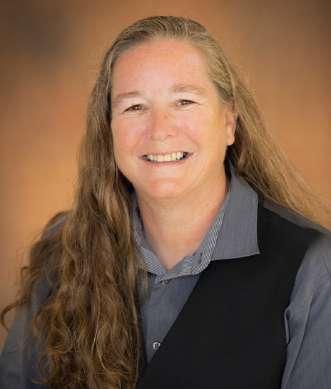
The Wisconsin state chapter of the Farmer Veteran Coalition was started in 2020. The chapter currently has over 800 registered members. This fall, we introduced our first printed newsletter, the “Forward Field Post” and this winter, we plan to kick-off a series of coffee shop networking events across the state.
Over half of our members are Army veterans, but there are members from each branch of the military, in addition to almost 50 associate members.
We host several events, attend tradeshows each year and send communications to our members, but we are always searching for more ways to network and bring veteran farmers together.
Veterans know military well, but they put their lives on hold to be in the military. After serving they come back to civilian life behind starting their careers. It can be a hard adjustment to find a good fit for skills learned while in service to transfer those over to a job back home. A little support in the right direction can make the difference to veterans finding happiness and success post-military.
You don’t need to be a veteran to join, but only veterans qualify for member discount benefits and the Fellowship Fund. The National FVC Fellowship Fund is a small grant program that provides direct assistance to veterans who are in their beginning years of farming or ranching. Grants range from $1,000 to $5,000. The application period opens in January 2026.
As a member you can also apply for the “Homegrown by Heroes” designation, which is a specific logo for branding your products. Recently, the Wisconsin Department of Agriculture Trade and Consumer Protection’s Something Special from Wisconsin (SSfW) program teamed up with Homegrown by Heroes to make a differentiated logo for veterans to place on their agricultural products. Usage of this logo is a collaborative effort between DATCP and the WI Department of Veteran Affairs (DVA). You can learn more about this process
Want to get more involved? Mark your calendar for November 5 and come meet FVC members at the FVCWisconsin Annual Meeting, to be held in Madison at the Wisconsin Farm Bureau office. The day starts with networking and coffee at 9 a.m. A full agenda is coming soon. Stay in touch on social media at www.facebook.com/ FVCofWisconsin.
Cope is a retired Lieutenant Colonel in the United States Marine Corps and a former federal employee whose career spans more than three decades of public service. In retirement, Cope turned her focus to farming, and also volunteering at her children’s school running the gardening program.
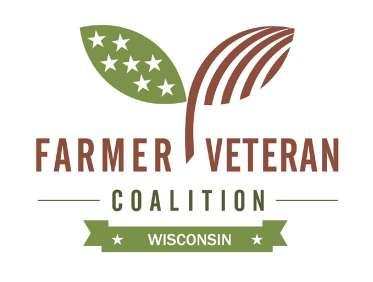

By Kendall Riskedal

Giving back to your community isn’t a one-size-fits-all experience, especially in Farm Bureau. Whether you’re stepping into leadership roles at the district or state level or starting closer to home in your county, there are countless ways to serve. And each one matters.
For me, the importance of service was something I saw modeled growing up. Both my parents and in-laws gave their time and talents selflessly, whether it was through schools, sports or agricultural organizations. They showed us that communities thrive when people step up, and they instilled in my husband and I a deep sense that giving back is not optional, it’s essential.
When my husband and I moved to Wisconsin after college graduation, we realized just how much we had taken for granted growing up in small-town Illinois. We were used to knowing everyone: classmates
graduation, friends’ parents and grandparents, cousins spread across neighboring towns. In Wisconsin, we didn’t know anyone, and it was a culture shock.
Fortunately, Farm Bureau became our bridge into a new community. It gave us a place to belong, people to lean on and friends to share life with. I often joke that I drive my car until the mileage range just barely gets me to a gas station, and while my husband warns me he won’t bring me gas if I run out, I feel confident that if it happens, I know someone from Farm Bureau in nearly every corner of the state who would come to my rescue. That safety net didn’t appear overnight. It grew because we were intentional about showing up, saying “yes” to opportunities and investing in relationships.
That’s the beauty of Farm Bureau: it’s built on neighbors helping neighbors, connecting people and creating community. Service looks different for everyone. For some, it’s helping at the county annual meeting. For others, it’s running for a leadership position at the state level. But each step matters. Each “yes” builds connection. Each hour of service strengthens the organization and the people in it.
It’s no secret that it’s harder to return to the farm or start a new farm in 2025. The “brain drain” out of rural America is real, and mental health concerns in younger generations continue to rise. Research shows one of the contributors is the lack of time spent with others in person. Farm
but it can provide something vital: authentic, in-person community. Those human connections are not just nice-to-have, they are essential to the health of our people and our towns.
So, if this sounds like you, if you’re looking for ways to plug in, give back and strengthen both yourself and your community, consider serving with Farm Bureau. There are opportunities big and small, and every single one makes an impact.
A great place to start is with the Young Farmers and Agriculturists Committee or the Promotion and Education Committee. Both provide meaningful ways to contribute, build leadership skills and create lasting connections. If you’re interested, scan the code below and someone will be in touch.
Together, let’s keep building strong communities — one act of service at a time.

Link: https://bit.ly/wifbcommitteeinterest
Riskedal is the current Young Farmer and Agriculturist Chair for Wisconsin Farm Bureau Federation.

Tell us a little about yourself.
We own and operate a certified organic farm where we raise beef, dairy, hogs and chickens. We have an on-farm store where we direct market all our meat, eggs and seasonal produce from our garden.
What do you enjoy most about your career in agriculture? Why?
We enjoy working with the animals and improving their genetics, growth and quality of life. We also enjoy the challenge of direct marketing our products and building relationships with consumers and sharing where their food comes from.
What is a success in your agriculture career that you are most proud of?
Starting our on-farm store and changing the direction of our farm after a barn fire and having to rethink how our farm will survive.
What is a Farm Bureau experience that you are most proud of and why?
Our Promotion and Education Committee farm tours. Our county has planned and gone on tours of different types of farms. We open it up to anyone who wants to go so they can see other areas of agriculture that they might not know much about.
What are some of the challenges you face in your career in agriculture and how do you handle them?
Our hardest challenge is cash flow. Since we are relying on customers to purchase our farm's products, there are times where there is not much cash coming in. We use these times to figure out new ideas on how we can increase our customer base and reach more people with our farm products.
Why are you proud to be a Farm Bureau member?
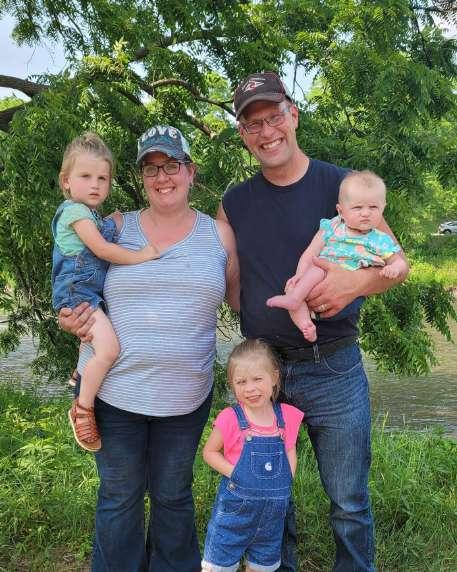
We are proud to be Farm Bureau members because it is a community of others that can understand the farming lifestyle and some of the struggle we go through. Farm Bureau is like family to us, and it is where we find support and strength at times when times are tough.
What is something that most Farm Bureau members would not know about you? Explain.
That we are very traditional and love old ways of doing things at times. We like doing some of the things on our farm in old traditional ways that our ancestors have done in the past.
What advice do you have for new Farm Bureau members or those looking to get more involved?
The best way for new members to get involved is to just ask. There are many times where we are looking for new people to get involved, but don't know who to ask.
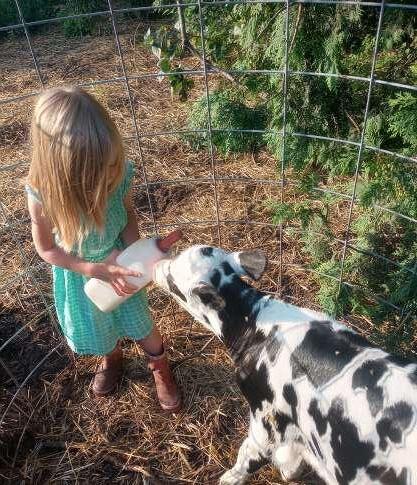


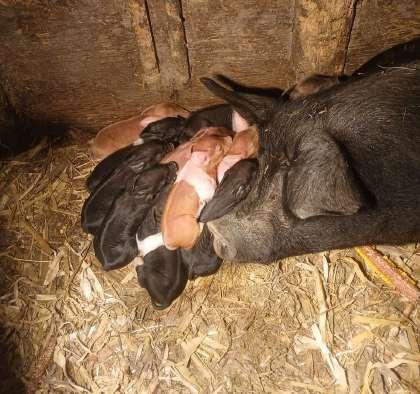











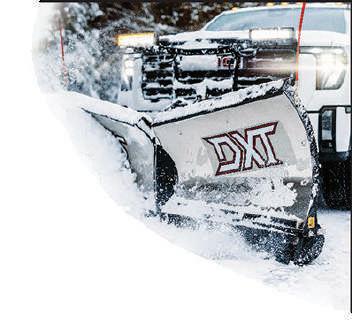

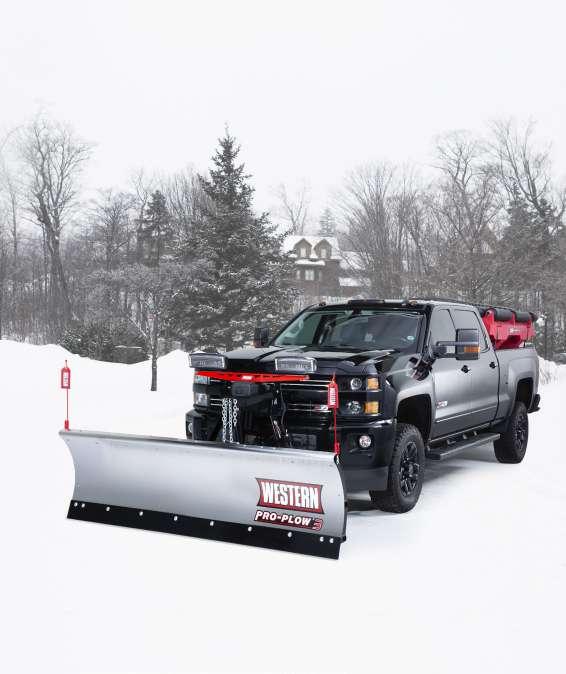
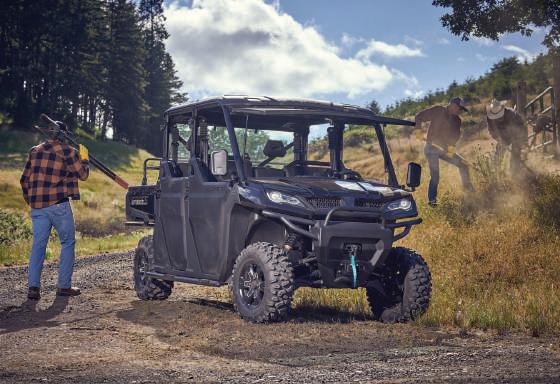



Not only are WFBF Young Farmer and Agriculturist Committee members serving as Farm Bureau leaders at the state level, but many of them are also active in their local communities and volunteer their time to causes that are important to them. From involvement in church programs, fair boards, alumni associations and fire departments to serving as role models and guiding the next generation of agriculturists, these young leaders are truly making an impact wherever they go.
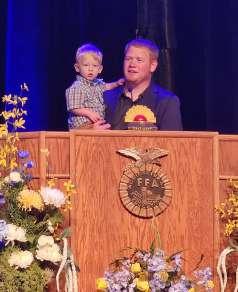
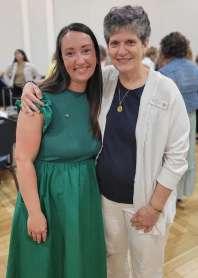
DISTRICT 1
Darren and Kendall Riskedal were active 4-H and FFA members growing up. They have continued their involvement as alumni, attending and speaking at events like the Illinois FFA State Convention and 4-H House 90th Anniversary Celebration.
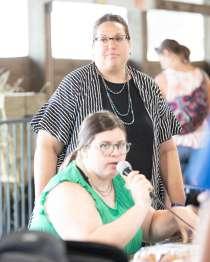
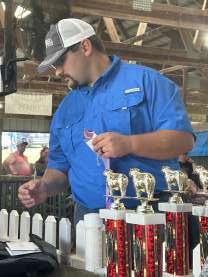
DISTRICT 3
Casey and Morgan Lobdell volunteer much of their time to helping youth with their livestock projects. At the Iowa County Fair, you will find them announcing the swine and sheep shows, handing out ribbons and coordinating the Master Showman Contest.
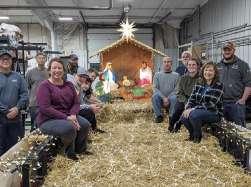
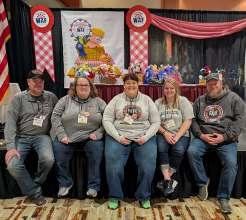
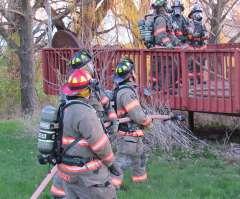
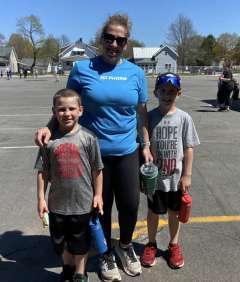
DISTRICT 2
Eric and Kadence Senkowski are members of the St. Thomas Church. Putting together the church float for their community Christmas parade is one of their favorite activities to help with.
DISTRICT 4
Heather Erdman plays an integral role on the Eau Claire County Friends of the Fair. She currently serves as the Corresponding Secretary and her husband, Steve, is the President.
DISTRICT 6
Luke Lisowe serves as a volunteer firefighter on the Town of Calumet Fire Department. For over five years, he has selflessly given his time to help others in emergency situations.
DISTRICT 7
Amanda Williams contributes a lot of time to her children’s involvement in sports teams. Whether it’s working concessions at baseball games, assisting with the Race for Education or volunteering at the Dairy Dash 5K, Amanda knows the importance of helping others live healthy and active lifestyles.
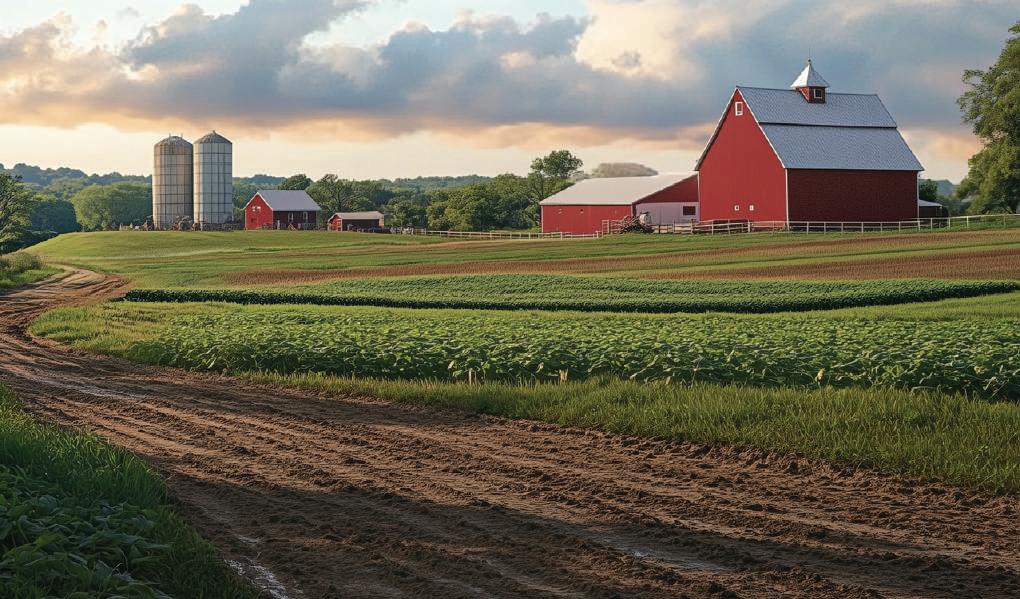

Available on the purchase or lease of an eligible new 2024/2025/2026 model year Ford Maverick®, Ranger®, F-150®, Super Duty or F-150 Lightning®. Not available on any other Ford or Lincoln vehicles, or F-150 Raptor®, F-150 Raptor R™, Ranger Raptor or F-650® and F-750® Super Duty. Vehicle eligibility may change at any time. Available to U.S. residents only. Place a new retail order or take new retail delivery from an authorized Ford Dealer’s stock by 1/05/26. Limit of five purchases or leases per household during the program offer (PGM# 32524). Offer subject to dealer participation. May not be used/combined with most other Ford private offers. See an authorized Ford Dealer, or go to www.fordrecognizesu.com, for complete details and eligibility (PGM# 32524). Due to high demand and global supply chain constraints, some models, trims, and features may not be available or may be subject to change. Check with your local dealer for current information. Offer subject to confirmation
Available on the purchase of an eligible 2020-2026MY Ford Blue Advantage Gold, EV (F-150 Lightning only), or Blue Certified, Ford Maverick, Ranger, F-150, Super Duty or F-150 Lightning with under 80,000 miles. Not available on any other Ford or Lincoln vehicles, or F-150 Raptor, F-150 Raptor R, Ranger Raptor or F-650 and F-750 Super Duty. Vehicle eligibility may change at any time. Available to U.S. residents only. This offer is not eligible for customers purchasing a vehicle in the state of Texas. Take delivery from an authorized Ford Dealer’s stock by 1/5/2026. Limit of five purchases per household during the program offer (PGM# 32678). Offer subject to dealer participation. May not be used/combined with most other private Ford offers. See an authorized Ford Dealer, or go to www.fordrecognizesu.com, for complete details and eligibility (PGM# 32678). Due to high demand and global supply chain constraints, some models, trims,
Super Duty. Vehicle eligibility may change Available to U.S. residents only. Place a new retail order or take new from an authorized Ford Dealer’s stock by 1/05/26. Limit of five purchases per household during the program offer (PGM# 32524). Offer subject participation. May not be used/combined with most other Ford private authorized Ford Dealer, or go to www.fordrecognizesu.com, for complete eligibility (PGM# 32524). Due to high demand and global supply chain some models, trims, and features may not be available or may be subject Check with your local dealer for current information. Offer subject to of eligibility.
2 Available on the purchase of an eligible 2020-2026MY Ford Blue Advantage EV (F-150 Lightning only), or Blue Certified, Ford Maverick, Ranger, F-150, or F-150 Lightning with under 80,000 miles. Not available on any other Lincoln vehicles, or F-150 Raptor, F-150 Raptor R, Ranger Raptor or F-650 Super Duty. Vehicle eligibility may change at any time. Available to U.S. This offer is not eligible for customers purchasing a vehicle in the state Take delivery from an authorized Ford Dealer’s stock by 1/5/2026. Limit purchases per household during the program offer (PGM# 32678). Offer dealer participation. May not be used/combined with most other private See an authorized Ford Dealer, or go to www.fordrecognizesu.com, details and eligibility (PGM# 32678). Due to high demand and global constraints, some models, trims, and features may not be available to change. Check with your local Ford Dealer for current information. to confirmation of eligibility.
BARRON
SWANT GRABER FORD 715-537-9500 www.swantgraber.com
CHIPPEWA FALLS
TOYCEN FORD, INC. 715-723-6060 www.toycenford.net
CLINTONVILLE
CLINTONVILLE MOTORS, INC. FORD 715-823-3154 www.clintonvilleford.com
FOUNTAIN CITY
FOUNTAIN CITY FORD INC. 608-687-4131 www.fcford.com
LA CROSSE
DAHL FORD TRUCK
608-385-9197 dahlfordtruck.com
MANITOWOC
MARITIME FORD-LINCOLN, INC. 844-207-0760 www.maritimeford.com
MONTICELLO
SYMDON FORD OF MONTICELLO 608-938-4345 www.symdonfordofmonticello.com
OSSEO OSSEO FORD SALES & SERVICE INC. 715-597-3185 www.osseoford.com
RIPON HOMAN FORD INC. 920-748-7777 www.homanford.net
WISCONSIN RAPIDS RAPIDS FORD LLC 715-422-0050 www.rapidsfordllc.com

Super Duty or F-150 Lightning®. Not available on any other Ford or Lincoln vehicles, or F-150 Raptor®, F-150 Raptor R™, Ranger Raptor or F-650® and F-750® Super Duty. Vehicle eligibility may change at any time. Available to
School is back in session, and the Collegiate Farm Bureau chapters are back in action for another year. WFBF has established Collegiate Farm Bureau chapters at UW-Madison, UW-Platteville and UW-River Falls. Each chapter is a student-run organization with an elected officer team and a faculty advisor.
Chapter officers plan a yearly program of work that typically includes regular meetings to conduct business, social activities,
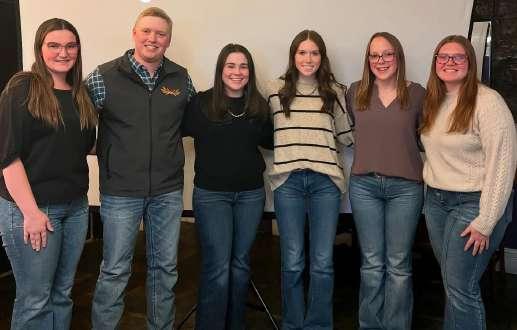
service projects and Farm Bureau events and activities on the county, state and national levels. Chapters are provided support from the Wisconsin Farm Bureau Foundation and Rural Mutual Insurance Company.
In August, Collegiate Farm Bureau officers from the three chapters visited the WFBF office for a day of learning, networking and planning. Be sure to ‘like’ each Collegiate Farm Bureau Facebook page to follow their activities and involvement throughout the year.
Front row, from left: Grace Mansell, St. Croix County, Treasurer; Brandon Boyd, Dodge County, Vice President; Kelly Herness, Trempealeau County, Public Relations; Josie Ammons, Massachusetts, Secretary; Amanda Bender, Walworth County, President; and Natalie Hensen, Dane County, Agriculture in the Classroom.

Collegiate Farm Bureau at UW-Madison
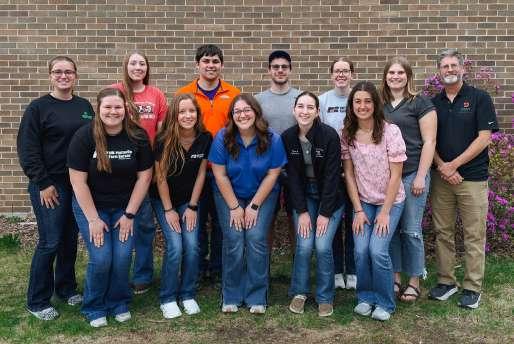
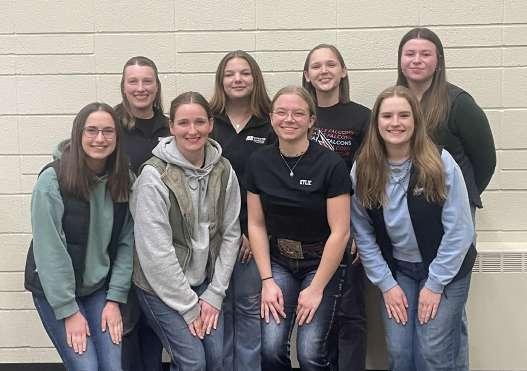
Front row, from left: Izzy McReath, Marquette County, Vice President; Jenna Brogley, Grant County, President; Raina Brown, Iowa, Brag About Ag; Kinsley Wetzel, Rock County, Secretary; and Brooke Grossheim, Manitowoc County, Brag About Ag. Back row, from left: Lilly Mitchell, Crawford County, Agriculture in the Classroom; Ellie Hildebrandt, Illinois, Ag in the Classroom; Layten Sobieski, Green Lake County, Historian; Owen Trone, Illinois, Treasurer; Megan Schulenberg, Indiana, Ag Day on Campus; and Kevin Bernhardt, Advisor.

UW-Platteville Collegiate Farm Bureau
Front row, from left: Ellie Sauder, Minnesota, Secretary; JoHannah Gehrke, Minnesota, Ag Day on Campus; Kylie Beilke, Outagamie County, Treasurer; and Brooke Beardsley, Sauk County, Vice President. Back row, from left: Dafney Yates, Lincoln County, President; Sierra Bakke, Marathon County, Reporter; Brooke Wittrock, Chippewa County, CAFES Representative; and Madison Heise, Marathon County, Ag Day on Campus.

UW-River Falls Collegiate Farm Bureau
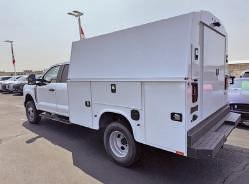




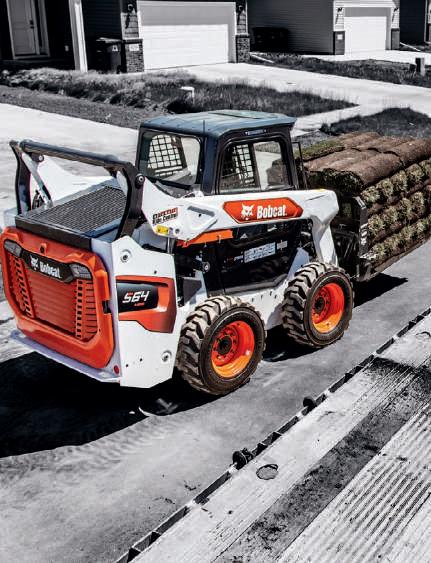





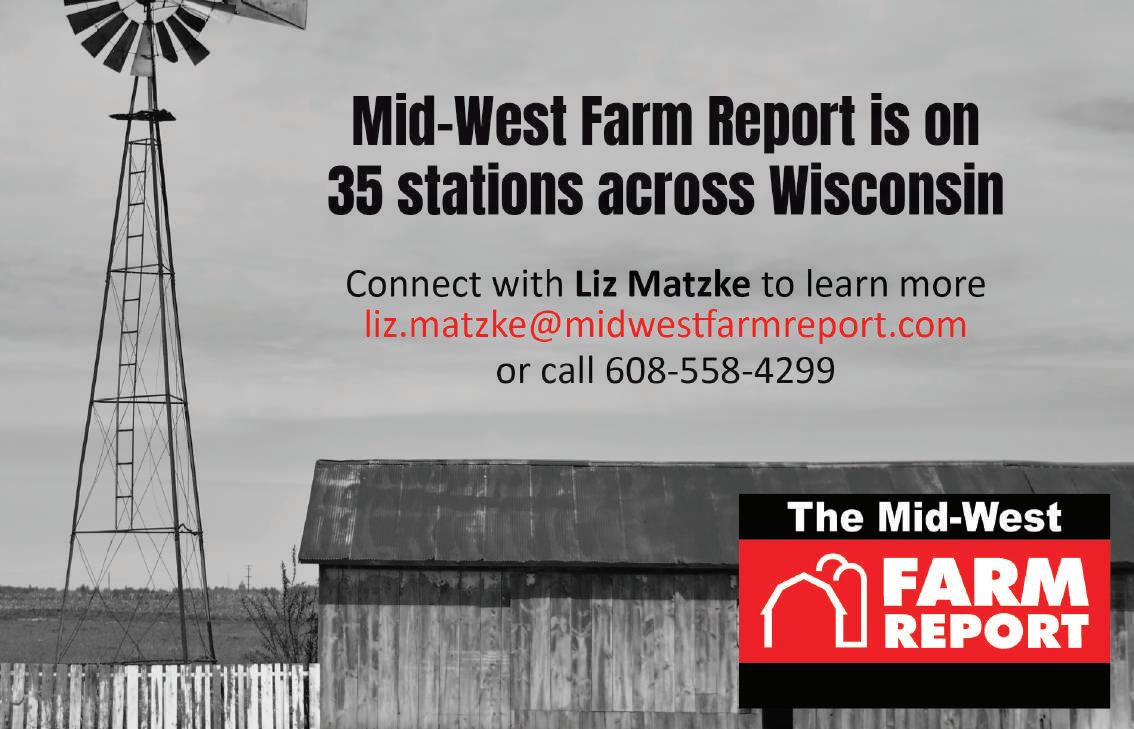
Ashley Schlender
Thank you to each District 1 County Promotion and Education Chair –your efforts are appreciated!
Clara Hedrich
Thank you to all of the Calumet County Farm Bureau board members for your work to make the annual “Meet Your Local Farmer” event a success!

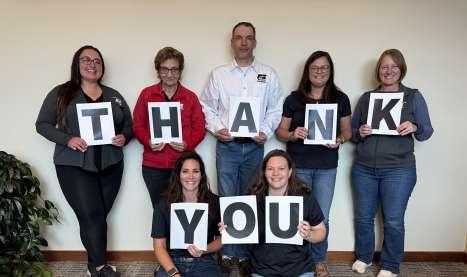
Tammy Wiedenbeck
Thank you District 3 volunteers for planting seeds of ag awareness and growing the future of food, fuel and fiber!
Brenda Dowiasch
Thank you to all of the volunteers in District 4. Keep up the great work – you are awesome!
Kari Schoenike
Thank you to all District 2 Promotion and Education volunteers for sharing the story of agriculture with consumers.
Jenny Leahy
Thank you District 5 volunteers for all you do to share the story of farming!
Steve Mueller
Thank you to all District 9 Farm Bureau volunteers who led and/or helped at all of our local engagement events!
FEBRUARY 21, 2026
9 a.m. to 3 p.m. in Neenah, WI
Keynote Speakers:
Marlene Eick, Ohio Farm Bureau
Annaliese Wegner, Modern Day Farm Chick
The Wisconsin Farm Bureau Promotion and Education Committee invites you join them for Cultivate & Connect. Scan for more Info!



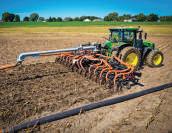
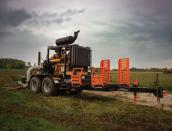
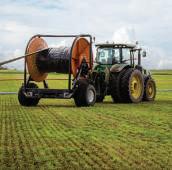
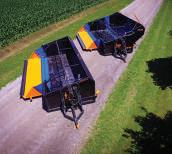
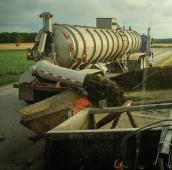


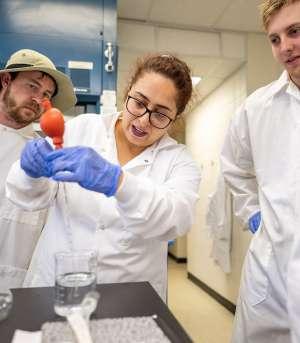

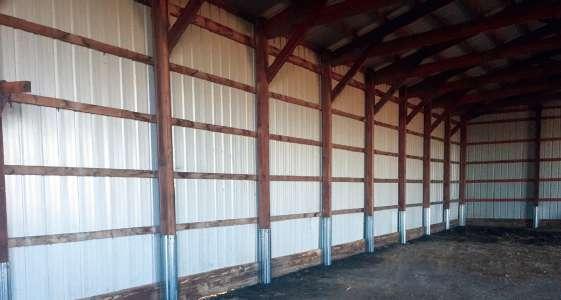
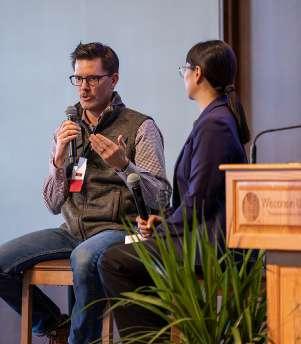

F arm Bureau prides itself on being a grassroots organization. Members belong to one of the 61 county Farm Bureaus. Throughout the state, local members advocate for Farm Bureau and agriculture in a variety of ways. Here are some of the activities and projects happening locally.
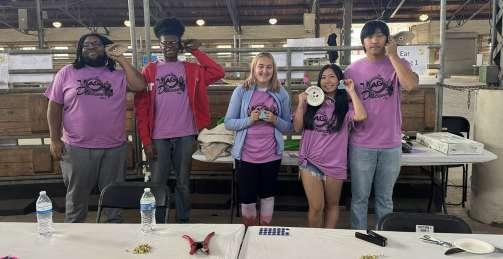
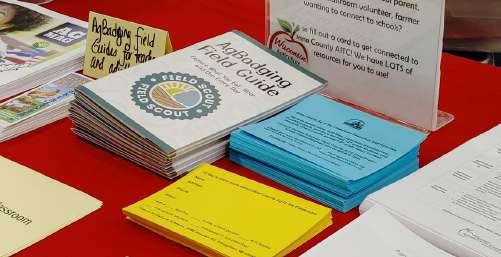
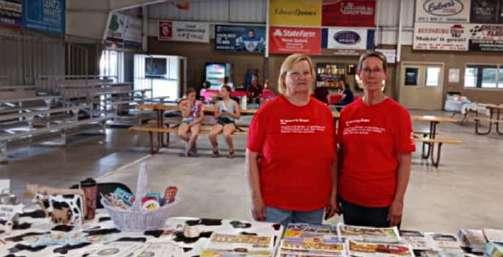
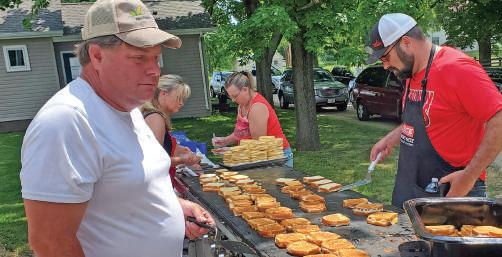
Milwaukee County Farm Bureau has sponsored projects at Vincent High School of Agricultural Sciences since 2018. Recently, the school added a new animal science complex with a classroom and attached barn, where the students learn about small and large animals. Throughout the year, students host a Holiday Market, Fish Fry and Ag-Ventures with a pancake breakfast, baby goat yoga and plant sale. Students get the opportunity to volunteer at Ag Discovery Day and even show animals at the Wisconsin State Fair, all possible with donations from the Milwaukee County Farm Bureau.
Dane County Farm Bureau’s Ag in the Classroom Committee hosted a table at the youth event on the Friday of the Dane County Fair. Committee members distributed fun face tattoos, Ag Mags, Farm Facts, bookmarks and Farm Fact pencils to students, teachers, home school parents, reading programs and 4-H leaders.
Sauk County Farm Bureau Ag in the Classroom went on the road to the Sauk County Dairy Breakfast at the Nolden’s Narrows Creek Family Farm and Butterfest in Reedsburg. Each event featured tables of agriculture handouts for participants and agricultural trivia questions.

The Winnebago County Farm Bureau and Dairy Promotion committee teamed up with the Oshkosh Parks Department to hold a June Dairy Day event on June 14 in downtown Oshkosh. The family-themed event included a petting zoo, educational games, a bounce house, entertainment, and creative crafts. The Winnebago County Farm Bureau also served up delicious grilled cheese sandwiches during the event.


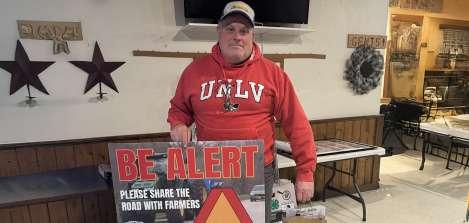

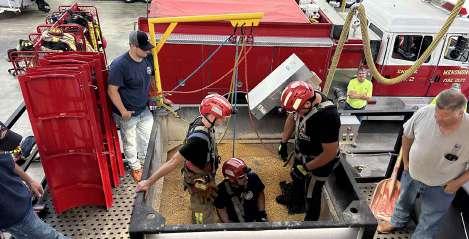
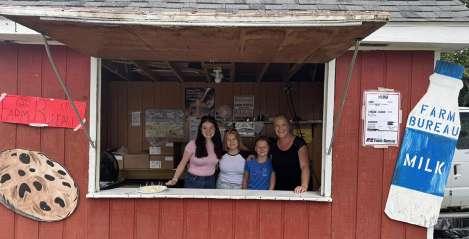
Door County Farm Bureau in conjunction with Door County Medical Center and the Door County Dairy Promotion Committee held their second annual Rural Safety Day on May 14. Held at the Door County Fairgrounds, approximately 240 students from area schools as well as home-schooled students were invited to participate. Students rotated through more than 15 different stations throughout the day.
Oconto County Farm Bureau received a Farm Neighbors Care Grant. The county partnered with other Oconto County agriculture groups to create and distribute rural road safety signs!

Marathon County Farm Bureau recently hosted a night of baseball and fun at a Wausau Woodchucks game. All county Farm Bureau members were invited and more than 130 attended. The county Farm Bureau organized a petting zoo and partnered with UWExtension for educational displays. In addition, Marathon County Partnership for Progressive Agriculture brought “Journey the Cow” to the event to offer kids the opportunity to try "milking" a cow.
The recent Grain Bin Rescue Training hosted by the Menomonie Fire Department with funding from Dunn County Farm Bureau highlighted the power of partnership, bringing together MFD staff, neighboring fire departments, the National Education Center for Agricultural Safety and local supporters. The training provided hands-on experience with grain bin rescue tubes in a realistic setting, a rare and invaluable opportunity. Thanks to everyone involved, rural emergency responders are better prepared to protect our farming communities.
This year marked Leah Saufl’s 15th year volunteering at the Pierce County Farm Bureau Milk Stand at the Pierce County Fair. As a Rural Mutual Insurance agent serving Pierce County, Leah knows the power of Farm Bureau membership and the importance of working together to support one another. Leah has shared the stand with her son, worked alongside former State Senator Sheila Harsdorf, and now has enjoyed having her daughter and nieces join her for the past three years.
Visit gatherwisconsin.com for more recipes.
• 1 pint assorted cherry or grape tomatoes, halved or quartered
• 8–10 fresh basil leaves, chopped or torn
• 1 clove garlic, minced
• 1 tablespoon olive oil
INSTRUCTIONS
• 1 pinch of salt
• 4 slices Italian bread, toasted
• 4 slices BelGioioso fresh mozzarella
• Optional: balsamic glaze for drizzling
1.In a small bowl, combine the chopped tomatoes, basil, garlic, olive oil and salt. Let sit for 5–10 minutes to allow flavors to blend.
2. Lightly toast slices of Italian bread until golden and crisp.
3. Place a slice of BelGioioso mozzarella on each toast.
4. Spoon the tomato mixture generously over the mozzarella.
5. Optional: Drizzle with balsamic glaze for a sweet-tangy finish.
6. Serve immediately and enjoy the taste of summer in every bite!


• 6 ears of sweet corn
• 1-2 fresh jalapeños
• 2 tablespoons Wisconsin honey
• 1 stick of butter
1. Shuck six ears of corn and set aside.
2. Fill large pot with water. Add jalapeños, butter and honey to the water and bring to a boil.
If you prefer more heat, add two jalapeños.
3. Carefully add corn to the boiling water and boil for 7-8 minutes.
4. Use a tongs to serve the corn and enjoy!
TIP: Remove from heat and leave the corn in the pot when it is done cooking so it continues to absorb the jalapeño honey flavor.
Your forests are an asset, just like your fields.

You’ve worked hard for your land— now let it work for you. With the Family Forest Carbon Program, you can have a successful farm and get paid to grow healthy forests.
No upfront costs, no change in ownership, no impact on your land rights, just expert support to boost your forest’s health, and guaranteed payments for 20 years.
Your land is more than property— it’s a legacy that can be passed down through generations, and we’re here to help you make the most of it.
Now enrolling landowners with 30+ acres of forest land in 19 states.

Wisconsin Agriculture in the Classroom is welcoming a new class of educators to its Educator Ambassador Team, an initiative that continues to grow in reach and impact. This year’s team includes seven teachers representing diverse grade levels, subject areas and regions of the state—all united by their passion for weaving agriculture into everyday learning.
The program, which launched last year, has quickly become a cornerstone of Wisconsin AITC. Ambassadors serve as peer leaders, sharing best practices, mentoring colleagues and guiding program development. They also provide professional development opportunities for teachers statewide, ensuring agriculture remains a meaningful part of K–12 classrooms.
Three new members join the ambassador team this year, bringing expertise that broadens the program’s reach:
• Sheila Kroseberg, Waupaca High School
• Kevin Podeweltz, Riverside Elementary School, D.C. Everest School District
These educators have already demonstrated the power of cross-curricular agriculture connections, from STEM to language arts, and are eager to continue sharing their expertise.
Team members were selected for their leadership in AITC programming, commitment to professional growth and dedication to helping students discover agriculture’s role in their daily lives.
The ambassadors began their training in August by mapping out a calendar of workshops, planning a new virtual professional development program and providing feedback on classroom resources. Throughout the 2025–2026 school year, they will lead workshops, host free online sessions and meet quarterly to shape the future of Wisconsin AITC.
Join the Ambassadors for the NEW After School with AITC, a FREE Virtual Professional Learning Community as they host their first session October 21, 2025, from 4 p.m. – 5 p.m. as they Dig into Wisconsin Soil with Read and STEAM lessons, industry experts and grant tips from Wisconsin AITC.
• Brooke Wittrock, Wisconsin–River Falls

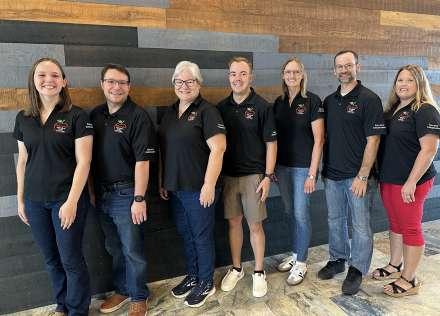
The team also welcomes back four ambassadors who have been instrumental in building the program’s foundation:
• Emily Kamps, Fennimore Elementary School
• Joshua Gonzalez, River Trail School for Agricultural Sciences, Milwaukee
• Mary Cooper, St. Mary’s Catholic School, Richland Center
• Travis Sprague, Medford High School
Register online at wisagclassroom.org.


In 2004, the Wisconsin Farm Bureau Women’s Committee launched a statewide writing competition for fourthgrade students to celebrate the 2005 National Ag Day. Since the program’s inception, over 37,000 students from across Wisconsin have entered original essays exploring the topics of agriculture innovation, soybeans and a plethora of Wisconsin agriculture commodities in between!
The Wisconsin Agriculture in the Classroom Essay Contest is excited to kick-off the 21st year of the program and invite 4th and 5th graders to explore how food, fiber and fuel shape our daily lives and communities. This contest isn’t just about writing—it’s about exploring, connecting and celebrating the importance of agriculture in Wisconsin.
Students are asked to create a 200–300-word narrative essay responding to this year’s prompt “Dig into Wisconsin Soil, Where Good Things Grow.” This year’s essay is inspired by the 2025 American Farm Bureau Foundation for Agriculture Book of the Year, The Soil in Jackie’s Garden, by Peggy Thomas. The narrative format will require research on the topic while offering an opportunity for writers to discover and share their personal connection to Wisconsin agriculture.
Essays are due February 15, 2026. Educators and volunteers alike are excited to launch and finalize the contest during a shorter time frame during the 2025-2026 school year. The early entry will not interfere with state-wide testing dates or spring breaks, which has been

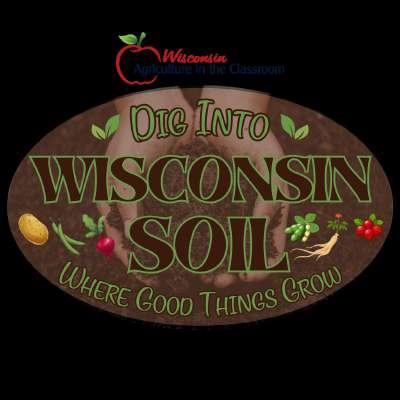
A new statewide “Top Ten Essays” will allow for more students to receive recognition in the state contest. The Top Ten Essays will be honored in each grade level and will earn a cash prize and medal. A state winner in each grade level will also be awarded with a cash prize and commemorative plaque.
This is a fun chance for students to dig into agriculture in their communities, see how it impacts their lives, and share their own personal connection with agriculture in a creative way!
The generous support of county Farm Bureau Agriculture in the Classroom programs and leading AITC program partners, including the Wisconsin Farm Bureau Foundation, Compeer Financial and the Wisconsin Soybean Marketing Board, make this learning opportunity possible.
Learn more and enter online at wisagclassroom.org.


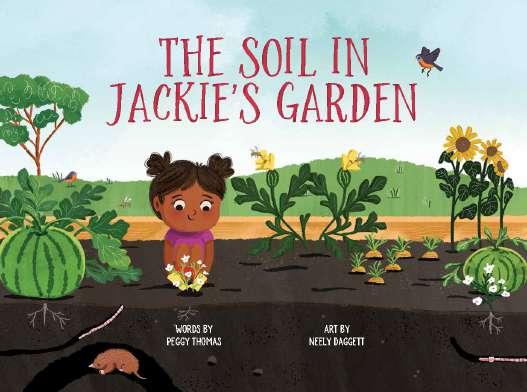





Thank you for participating in Wisconsin Farm Bureau Foundation Giving Day! Your support helps create informed consumers, engaged leaders and strong farmers by funding programs like Agriculture in the Classroom, Young Farmers and Agriculturists, Promotion and Education, Farm Neighbors Care, Gather Wisconsin and more.
Together, we raised over $59,000 on Giving Day on August 13, 2025. Since 2022, Giving Day fundraisers have generated over $180,000 for the Foundation.
Explore just a few examples of how your support has made a difference this year:
Over 1,500 students from 114 schools participated in Wisconsin Agriculture in the Classroom’s Essay Contest. Wisconsin fourth and fifth graders were asked to author an essay with the theme ‘A Wisconsin Tree and Me: How Trees Grow Food and Fiber’ as part of the annual essay contest that focuses on food and agriculture.
Gather Wisconsin website traffic grew 250% in the last year. Gather Wisconsin connects with consumers through delicious recipes and insightful blogs to build relationships between food, family and farming.
14 Wisconsin Farm Bureau members are sharpening their leadership skills in Leadership Institute Class 16. This year-long leadership training program’s mission is to
develop strong and effective agricultural leaders. The training consists of five, multi-day sessions that provide hands-on learning on agricultural issues, leadership development and speaking skills. To date, over 200 members have graduated from Leadership Institute.
300 FFA members attended FFA Farm Forum in February. FFA Farm Forum provides the next generation of agricultural leaders with valuable experience and essential leadership skills. During the one-day conference, FFA members participated in career-based workshops.
Over 50 Farm Bureau members attended the first ever Cultivate & Connect Conference hosted by the Promotion and Education Committee. Attendees left the conference equipped with new resources, fresh ideas and innovative practices to conduct impactful consumer outreach activities in their communities.
24 Young Farmer and Agriculturist members visited Washington, D.C. in June for the YFA Fly-In. During their visit, YFA members met with Wisconsin’s congressional delegation in Washington, D.C. to discuss issues impacting agriculture.
The Wisconsin Farm Bureau Foundation would like to extend a special thank you to all Giving Day 2025 sponsors, donors and supporters. Your support makes these programs and more successful.

Buffalo County Farm Bureau
Clark County Farm Bureau
Columbia County Farm Bureau
Dane County Farm Bureau
Dodge County Farm Bureau
Door County Farm Bureau
Dunn County Farm Bureau
Eau Claire County Farm Bureau
Fond du Lac County Farm Bureau
Green County Farm Bureau
Christina Benson
Isaac Christenson
Neil Christianson
Andrew Dal Santo
Paul & Jill Dalebroux
Dave & Kim Daniels
Brenda Dowiasch
Jonathan & Amy Eckelberg
Laura Finke
Tim Fiocchi
Lindsay Fowler
Bob Fox
Matt & Mandy Ganser
Ken Harter
Green Lake County Farm Bureau
Jefferson County Farm Bureau
Kenosha County Farm Bureau
Kewaunee County Farm Bureau
Langlade County Farm Bureau
Lincoln County Farm Bureau
Manitowoc County Farm Bureau
Marathon County Farm Bureau
Marinette County Farm Bureau
Milwaukee County Farm Bureau
Richard Hauser
Becky & Matthew Hibicki
Christa Hoffman
Reuben & Betty Hopp
John Hromyak
Sara Huber
Jeffrey Huber
Ben & Steph Huber
Derek Husmoen
Trevor & Melissa Jacobson
Caroline Kannel
Dan Kauer
Badger Football Tickets
Donated by M3 Insurance
Congrats to winner: Sara Menard Huber
Martina Keller
Rob Klussendorf
Louis & Carol Korth
Savannah Kunes
Rachel LaCount
Edith Lauscher
Sara Leach
Kent Leach
Lynn & Mike Leahy
Bob & Lisa Leege
Anzy Maerz
Jenny Martin
Rich & Darci Meili
Oconto County Farm Bureau
Outagamie County Farm Bureau
Ozaukee County Farm Bureau
Portage County Farm Bureau
Price County Farm Bureau
Racine County Farm Bureau
Sauk County Farm Bureau
Shawano County Farm Bureau
Sheboygan County Farm Bureau
St. Croix County Farm Bureau
Dan & Julie Merk
Dan & Becky Meyer
David & Barb Mickelson
Arch Morton Jr
Jason Mugnaini
Bob Nash
Robert & Betty Nigh
Brad & Vicky Olson
Richard Piechowski
Chris & Kelly Pollack
Brian Preder
Brenna Ramsden
Dennis Rasmussen

Superior Shores County Farm Bureau
Taylor County Farm Bureau
Walworth County Farm Bureau
Washington County Farm Bureau
Waukesha County Farm Bureau
Waupaca County Farm Bureau
Winnebago County Farm Bureau
Wood County Farm Bureau
Jim & Kari Renn
Edward & Laura Rippley
Kendall & Darren Riskedal
Edward Romanowski
Katie & TJ Roth
Beth Schaefer
Josh Schenk
Sally Schoenike
Kari Schoenike
Ariella Schreiber
Mark Schuster
Sam & Julie Skemp
Cassie Sonnentag
Outlaw Music Festival Tickets
Donated by Mid-West Farm Report
Congrats to winner: Katy Katzman
Raegan Statler, Edward Romanowski, Neil Christianson, Nicole Steinbach and Katie Roth.
The Wisconsin Farm Bureau Foundation was established in 1988 to provide support for agricultural education and leadership programs. Through donations and other contributions, the foundation invests time and resources to support the next generation of agriculturists.

Raegan Statler
Nicole Steinbach
Christine Uken
Wendy Volkert
James Wehinger
Tammy Wiedenbeck
Loren & Ruth Wolfe
Jennifer Zinda


Your support helps create informed consumers, engaged leaders and strong farmers by funding programs like Agriculture in the Classroom, Young Farmers and Agriculturists, Promotion and Education, Farm Neighbors Care, Gather Wisconsin and more. Scan the QR code to donate today!
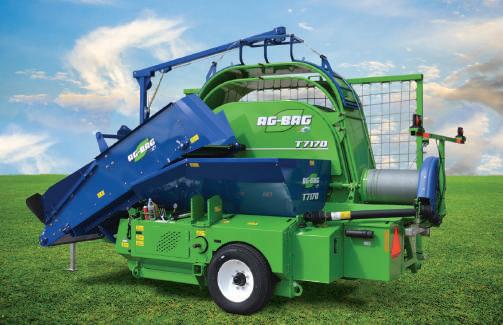
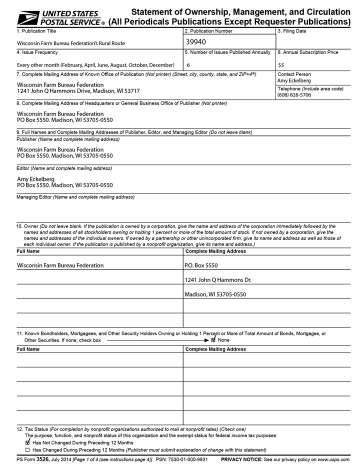
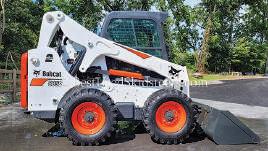
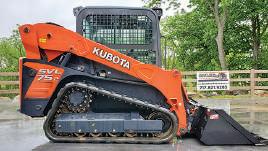
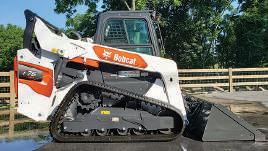
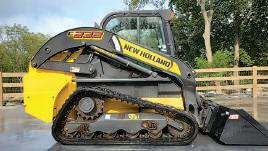

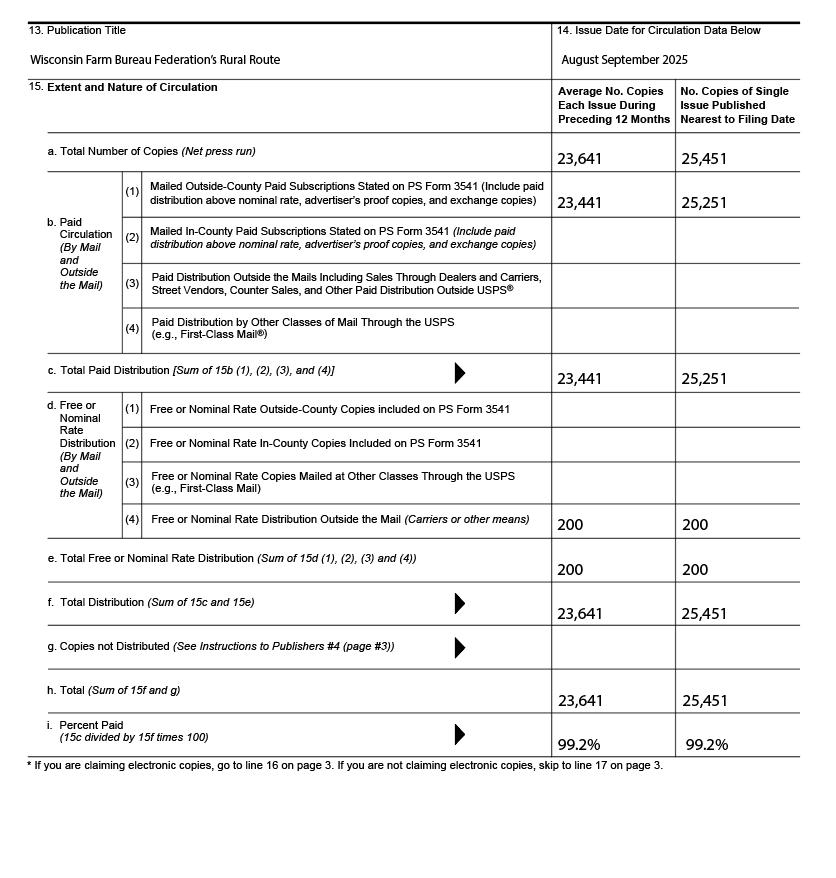
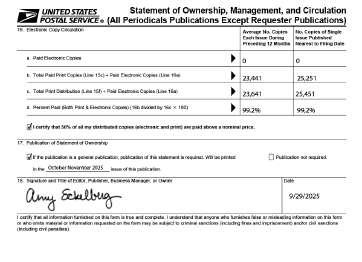
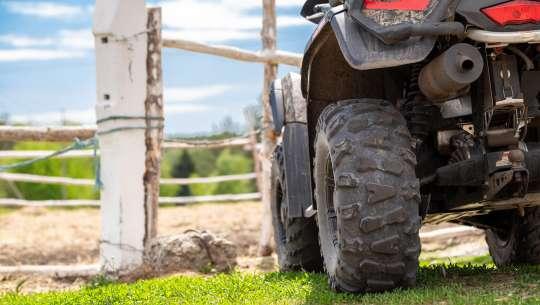
Farms often rely on All-Terrain Vehicles (ATVs) and Utility Task Vehicles (UTVs) for various tasks, such as transportation, hauling equipment and managing livestock. While these vehicles are convenient and efficient, it is crucial to prioritize safety to prevent accidents and injuries. Every year, thousands of individuals require emergency room visits due to ATV and UTV accidents, often caused by driver error.
Always wear a helmet, gloves, long pants and sturdy footwear when operating ATVs and UTVs. In the event of a collision or rollover, this protective gear can significantly reduce the severity of injuries. When available, seat belts must be worn at all times to minimize the risk of ejection.
Also, never operate an ATV or UTV while under the influence. Impaired judgment and slower reaction times greatly increase the risk of accidents.
Never exceed the recommended load capacity of the vehicle. Overloading can affect stability and maneuverability, leading to accidents. Similarly, single-person ATVs should never carry passengers. Each vehicle has a designated seating capacity and exceeding it can lead to an increased risk of injuries for all occupants.
Be aware of where you are driving. Steep and uneven terrain can pose significant challenges for ATVs and UTVs. These vehicles have a higher risk of rollovers when navigating steep slopes. It is crucial to assess the terrain before proceeding and avoid areas that may compromise stability and control, especially across wet ground. If you have to drive at night, take extra care to turn on lights and reduce speed.
Consider enrolling teens and kids in ATV safety classes or training programs. These courses provide valuable knowledge on safe operating practices, handling techniques and risk awareness.
ATV and UTV safety on farms should be a top priority for every operator. By following the guidelines, you can significantly reduce the risk of accidents and injuries.
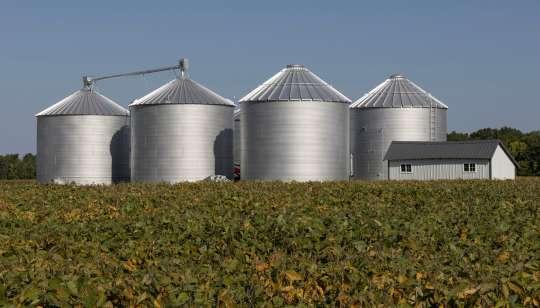
Grain bins are a staple on many farms, but they can also be one of the most dangerous places to work. Grain entrapment happens fast, and without the right precautions, even the most experienced farmer can find themselves in a life-threatening situation.
Ryan Ripp is a fourth-generation farmer and fire chief at the Dane Fire Department. He shares key insights on how to prevent tragedy and what to do if an accident occurs.
Before entering a grain bin, always check the condition of the grain. Mold and crusted grain are clear warning signs. Using a stick to test the surface can help determine if the grain is loose and safe to walk on. What looks solid may be hiding air pockets that can collapse under your weight.
Always have a spotter. A second person can call for help, monitor your safety and respond quickly if something goes wrong. Going in alone is never worth the risk. This is something Ripp emphasizes on his family’s farm in Dane (30 minutes northwest of Madison).
One of the biggest dangers inside a grain bin is equipment being turned on while you’re working. A simple lockout/tagout device on electrical panels ensures that no one accidentally flips a switch that could cause augers or conveyors to start running, pulling you into the grain.
Tie yourself off with a rope or harness that’s secured outside the bin. This precaution can stop you from being completely pulled under if the grain starts to shift.
Basic safety gear goes a long way. Here are four items Ripp recommends:
• Breathable masks protect against poor air quality.
• Lifeline ropes provide fall and entrapment protection.
• Shovels help move grain in emergencies.
• Gas meters detect dangerous air quality issues.
Many farm supply stores, local fire departments and even online retailers can help farmers get access to this equipment.
Safety doesn’t stop with equipment. Many local universities, county extension offices and farm organizations offer training.
Rural Mutual is the number one farm insurer in the state. Reach out to your local Rural Mutual agent to make sure your farm is properly protected.
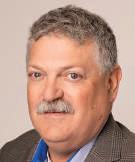


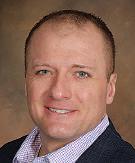
920-832-0262 BLACK RIVER FALLS MATT RHODES 715-284-2522
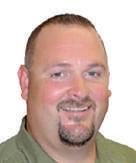



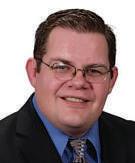
ABBY RYSKOSKI 715-460-3309
JACOB SHROPSHIRE 920-350-0285 DARLINGTON TOBY SPILLANE 608-776-4455 DE PERE JUSTIN MAULICK 920-241-1814
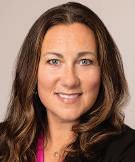
GALESVILLE CINDY JOHNSON 608-525-3311

JANESVILLE CHRIS KLUND 608-931-9174

GLENBEULAH WALTER CAMP 920-893-1811
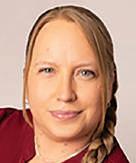
LAKE GENEVA ASHLEY ROGERS 262-203-5678
DODGEVILLE SUSAN BRUGGER 608-935-2769

HAYWARD JOSHUA HURAY 715-934-2400

LAKE GENEVA ROBERT HANNA 262-729-4034

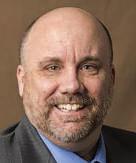
EAU CLAIRE CADEN MILLER 715-944-5466 FT ATKINSON CHAD WIEDENHOEFT 920-563-9355

HILLSBORO KELLIE KLEDEHN 608-345-5686
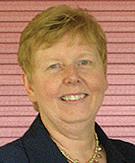
MARKESAN GALE WIERSMA 920-398-3706

HORTONVILLE JASON MUNSON 920-779-3080

MONONA LOUIS BENTLEY 608-221-1137

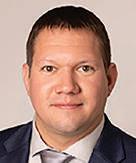



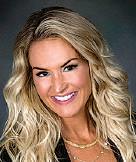

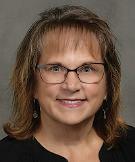


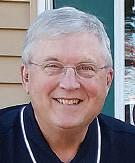
608-783-0062 RICE LAKE GREG HAYES 715-475-1051 RIDGELAND TYLER HOLTEN 715-949-2122 SPARTA LYNN LUCKASSON 608-269-3173

STEVENS POINT GALYNNE RIGGENBACH 715-575-1195

VIROQUA NICOLE STEINBACH 608-637-2139
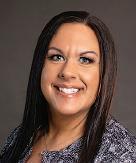
STEVENS POINT JENNI ZINDA 715-341-5808

WAUPACA DAVE LOKEN 715-258-8830

STURGEON BAY JASON SCHOEFFLER 920-743-9206

WAUTOMA VICTOR MAGNUS 920-787-9555

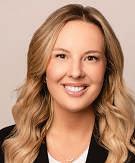
THORP RYAN DILLENBECK 715-669-5400 VALDERS PAIGE STROUF 920-775-4214

WEST BEND DANIEL PUSH 262-338-0656

WISCONSIN RAPIDS TIM COMEAU 715-421-5880
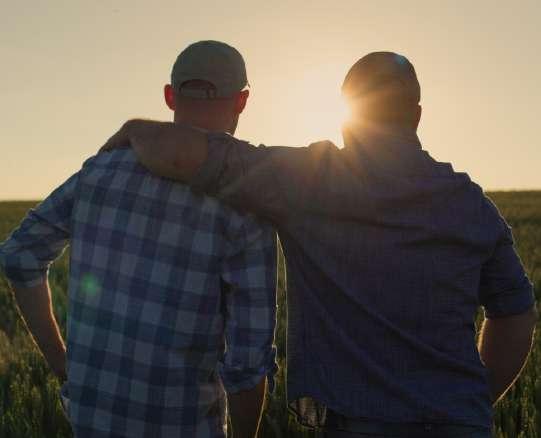
Retirement often comes with a party featuring dinner, drinks, cake and farewell speeches, but on the farm, it’s usually far less festive AND far more complicated. For many farmers, stepping away from the land isn’t just leaving a job, it’s walking away from a lifelong identity.
That’s why so many farmers struggle with the idea of retirement, says University of Missouri Extension Farm Transition Specialist Wesley Tucker.
Many farmers fear losing their sense of purpose after retirement. That’s why some hold onto the farm too long, when all aspects of the job become too difficult to manage effectively.
But Tucker says there’s a way to embrace a new chapter that still honors a farmer’s identity.
Most farmers don’t want to walk away completely, and that’s completely understandable. Instead, Tucker encourages a gradual shift in roles. Becoming a farm advisor, coach or mentor allows retiring farmers to stay involved in meaningful ways.
In addition to mentoring family members and employees on the farm, volunteering in ag education or conservation can be highly rewarding.
Although staying connected is essential in “passing the torch”, it’s also important to begin separating from the farm. Spending more time with grandchildren or taking up longdelayed hobbies can unearth a new sense of purpose for farmers.
Tucker’s advice for farm families is not to wait until the last minute to start succession planning. He believes succession planning starts the moment kids are given their first farm chores. Establish expectations with them, provide guidance, then set them loose to figure things out on their own. Giving them autonomy builds confidence, skills and a natural transition of responsibility over time.
Farmers should develop a business succession timeline no less than five years prior to retirement. They should gradually shift management responsibilities in the following manner:
• Year 1–2: Begin mentorship and decision-sharing
• Year 3–4: Shift day-to-day operations and recordkeeping
• Year 5+: Formal transfer of ownership
Soon-to-be retirees should make this timeline visible to family members and employees. It should also be a regular discussion topic during check-ins, to give all stakeholders ample time to mentally and emotionally prepare for the pending transition.
Not every family has a transition plan. The idea of sitting down to talk about “what’s next” can be intimidating, especially if mom or dad typically avoid the topic altogether — research shows older generations are more likely to avoid or deflect uncomfortable conversations compared to younger generations. Tucker encourages families to ask gentle, thoughtful questions to spark conversation, like:
• "What was succession like when you took over?”
• “What do you wish had gone differently?”
• “What went better than you expected?”
These kinds of conversations help open the door to planning, even if it's just planting the first seed. Succession can cause emotions to run high— many conflicts arise not from money, but from unmet expectations or lack of communication. If these conversations become challenging, consider bringing in a neutral third party (attorney or ag consultant) to help navigate the discussion.
Whether or not a third party is involved, be sure to:
• Discuss everyone’s desires, concerns and capacity to be involved.
• Address “fair” vs. “equal” issues among heirs early.
In the end, succession isn’t about quitting—it’s about redefining the farmer’s role.
As the number one farm insurer in Wisconsin, Rural Mutual provides knowledge and insight to help you make the best decisions to protect your farm and way of life. That’s why we go beyond the policy by providing educational content on best practices – from farm safety to succession planning. Reach out to a local agent to learn more.




Excluding life insurance from your financial strategy is like leaving your most dynamic player on the bench. With the ability to help fund retirement, pay for college and even help cover expenses if you become chronically ill, life insurance is both strong and versatile.
Get life insurance in the game. Contact your agent about how we can tackle your life insurance needs and make a game plan together.
You accepted me as a new business with rates I could afford. Other companies refused to quote me or were outrageously high. As a small rural farm repair business, I needed an insurance company that understood my business risks. There are very few companies like Rural Mutual.
Dean, Prairie Machine Works
Prairie du Sac




Connect with your local agent

